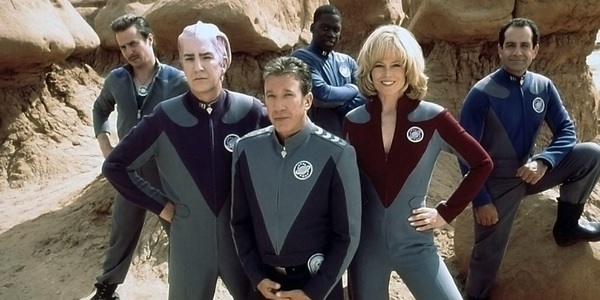
On the fifteenth anniversary of a certifiable comedy classic, MTV offers up an oral history of Galaxy Quest. “George Takei: [It’s] a chillingly realistic documentary.”
Haunting the Web Since 1999

On the fifteenth anniversary of a certifiable comedy classic, MTV offers up an oral history of Galaxy Quest. “George Takei: [It’s] a chillingly realistic documentary.”
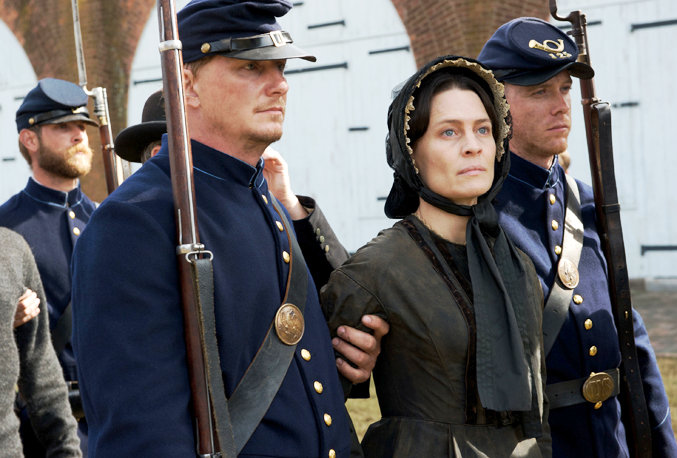
The good news is The Conspirator is nowhere near as preachy and inert as Redford’s last attempt at liberal muck-raking, Lions for Lambs. (I’ll confess I don’t have much patience for didactic message movies that bray at me to embrace opinions i already hold — See also Paul Greengrass’ Green Zone.) Nonetheless, this film still occasionally suffers from the same mix of well-meaning blandness and dramatic torpor that characterizes almost all of Amistad, Steven Spielberg’s similar 19th century courtroom exercise: The values being reified are all laudable, to be sure, but the story as told is strangely lifeless (and I say that as someone who probably enjoys the genre of movies-to-be-shown-in-high-school-history-when-the-teacher-is-out more than most.)
Fortunately, the movie grew on me after awhile. Its depiction of broader Washington DC often feels stagy, and some of the acting support here doesn’t help matters. (As Surratt’s daughter Anna, Evan Rachel Wood overdoes it in her every scene, and the very 21st-century Justin Long is just miscast here as a Union veteran.) But as the lens of the story narrows down to the nitty-gritty of the court case in its middle hour, The Conspirator finds a surer footing. At its best moments, Redford’s film feels like an episode of Law and Order: Civil War Unit, one whose resonances — military tribunals, indefinite detentions, victor’s justice, and whatnot — still feel “ripped from the headlines.”
After establishing that our protagonist here, Frederick Aiken (James McAvoy, with an impressive American accent — he should help out his countryman Ewan) is a Union war veteran wounded in his nation’s service, The Conspirator begins with the terrible crime that will concern us. On the night of April 14, 1865, only five days after Lee’s surrender at Appomattox, several men attempt to kill President Lincoln, Vice-President Johnson, and Secretary of State Seward, with mixed results. Seward manages to survive some nasty stab wounds, Johnson’s killer loses his nerve…but, as we all know, the flamboyant actor-turned-assassin John Wilkes Booth manages to kill the 16th President of the United States in cold blood. It is a horrible act of treason, the first assassination America has ever seen, and, make no mistake, everyone involved will pay.
And so, under the direction of Secretary of War Edwin Stanton (Kevin Kline, only slightly less Cheneyesque than Richard Dreyfuss in W) the conspirators (minus Booth, who is shot during capture) are rounded up and put on, for all intent and purposes, show trial — one headed by military men and quite clearly designed to come back with guilty verdicts. (FWIW, this film mostly elides over the Manhunt part of the story.) Nonetheless, according to that quaint old Constitution, even such dastardly criminals as these deserve defense counsel, and ultimately the young Union lawyer we met at the outset is roped into defending Mary Surratt (Robin Wright) by his mentor, Maryland senator Reverdy Johnson (Tom Wilkinson).
Captain Aiken takes to his new position reluctantly, especially since he feels pretty certain that Surratt — the proprietress of the boarding house where the conspirators plotted — is guilty as all Hell. But as he learns more of Surratt and her pious Christian, Ur-mother ways, he starts to wonder if maybe she’s just taking the fall for her son John (Johnny Simmons of Jennifer’s Body), who is still on the lam. And, as he grows ever more sick of the obvious railroading happening at trial under the direction of Judge David Hunter (Colm Meaney) and prosecutor Joseph Holt (Danny Huston, doing his officiously sinister bureaucrat thing), Aiken becomes a convert to his duties, even as proper Washington society begins to shun him for seeming to take on the Confederate cause. Sometimes a man has to make a stand, etc. etc.
I don’t know much about the Mary Surratt trial other than what Wiki has to offer, so I can’t tell you if Redford and screenwriter James Solomon have done justice to the specifics of the story — It seems to have a versimilitude about it, at any rate. But one place where I thought The Conspirator faltered is in establishing the Big Picture. True, the film begins grimly with Lincoln’s assassination — hard to fault it there, I suppose. But particularly once the courtroom scenes take hold, it doesn’t do a very good job of putting everything in emotional context — that all of this is happening mere days and weeks right after the close of America’s bloodiest war. (Nor, for that matter, is slavery mentioned.) And so, while the Law and Order aspects of the story are often compelling in their own right, the trial also feels flat, and strangely disconnected from all the events that put it in motion.
Which is too bad, really. Since, if anything, that Civil War backdrop adds depth to the viewpoint Redford seemed to be trying to uphold. There we were after four years of bloody war, 600,000 dead and the president assassinated, and Aiken is still taking a stand for the constitutional rights of Mary Surratt — even though an innocent verdict might well put the sides at each other’s throats again. (Contrast this with the cowardly behavior our past two administrations have shown with regard to tribunals, detentions, Gitmo, etc, even though, neither on 9/11 or since, has Al Qaeda ever represented the kind of existential threat to our republic that we faced in 1865.)
Speaking of the Civil War angle: In a way, I admire the shrewdness of this film: It tries to pitch a civil liberties morality play in such a way that the people who will feel most aggrieved about the injustices being shown, civil libertarians notwithstanding, are the folks among us with residual sympathy for the Confederacy — not normally a left-leaning or libertarian bunch. But, let’s get real: They’re not going to see this film, or, if they do, see it as anything other than lefty propaganda. Like Inside Job or Casino Jack and the United States of Money, The Conspirator is for the most part just preaching to the choir. One of the best things you can say about it is that, for the middle hour at least, you may not mind humming along.
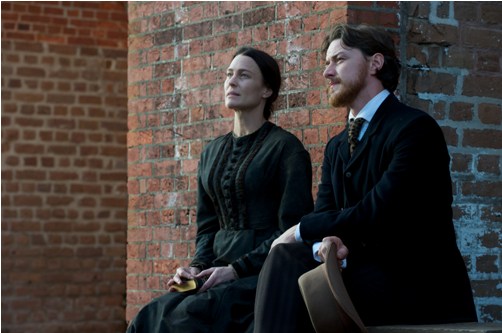
“A military trial of civilians is an atrocity…” Now isn’t that quaint? Union war hero James McAvoy finds himself reluctantly defending Robin Wright (a.k.a. Mary Surratt), a possible accessory to the assassination of Abraham Lincoln, in the trailer for Robert Redford’s The Conspirator, also with Kevin Kline, Justin Long, Alexis Bledel, Evan Rachel Wood, Colm Meaney, Danny Huston, and Tom Wilkinson. Here’s hoping the historical setting here can ease the didacticism that marred Lions for Lambs.
Merry Christmas, everyone. As we’re at the halfway point of the big decade list — Pt. 1, Pt. 2 — now seems like a good time to uncork the usual end-of-year movie list. Think of it as a new-stuff sorbet before we move to the final fifty.
I should say before we start that there are a few movies I’ll very likely see from 2009 — most notably The Lovely Bones, A Single Man, and The Imaginarium of Dr. Parnassus — that aren’t included due to their limited release schedule — most don’t arrive around these parts until 2010. The better-than-expected Sherlock Holmes, which I saw yesterday and have not yet reviewed in full, is also not here, although I did think of slotting it in at #20 before the Victorian-era tazer and remote-controlled cyanide bomb showed up. And there are still a few other stragglers I wouldn’t mind catching at some point, most notably Invictus and The Messenger. But if any of these are really, really great, they’ll either get backdated in or show up in next year’s list, as per usual. So don’t worry — credit will get paid where due.
In the meantime, as has been the standard — and although the decade list has been working differently — we start at #1 and proceed from there. And without further ado, the…
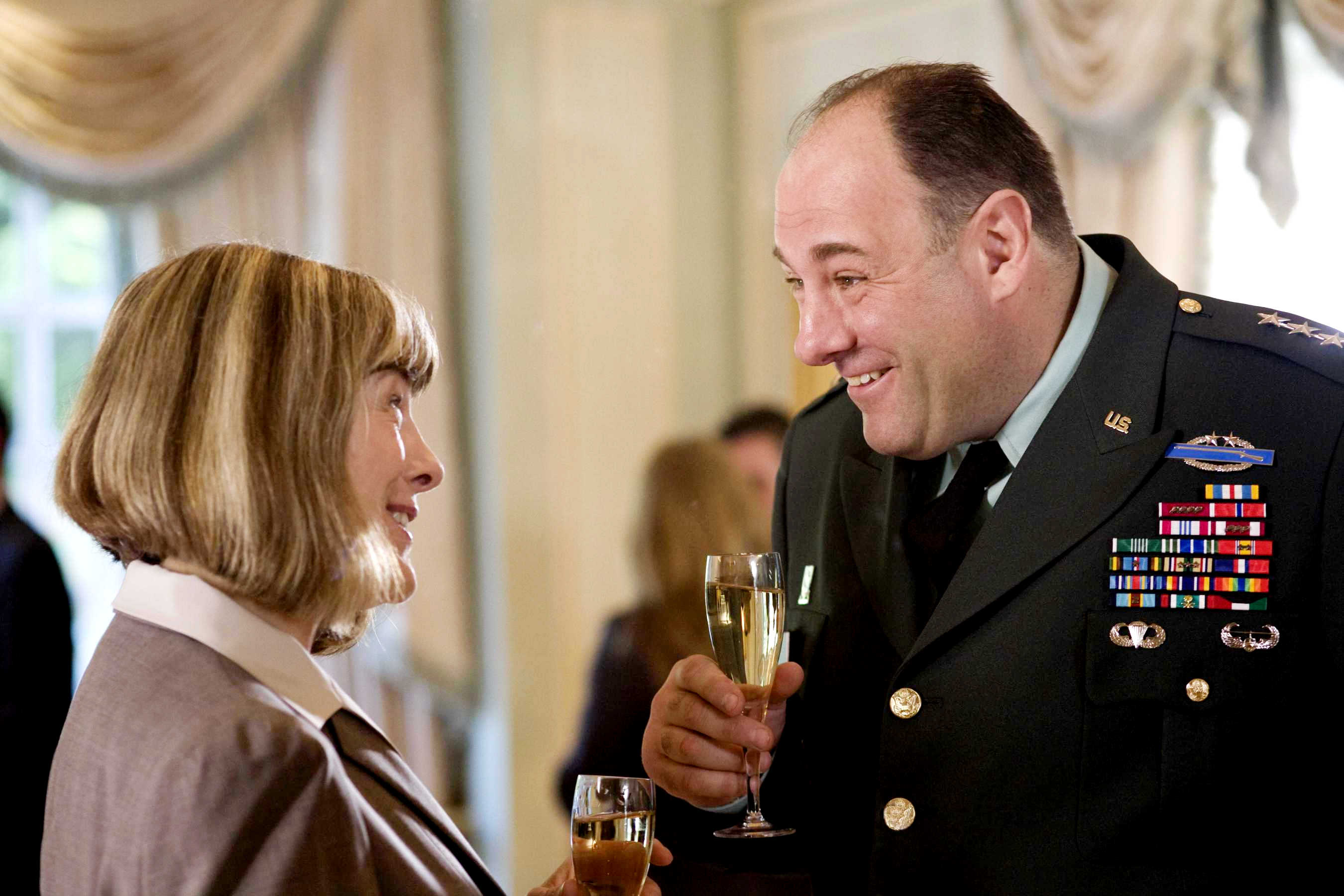
1. In the Loop: “Tobes, I don’t want to have to read you the Riot Act, but I am going to have to read you some extracts from the Riot Act, like: Section 1, Paragraph 1: Don’t leave your boss twisting in the wind and then burst in late, smelling like a pissed seaside donkey.” Even if I hadn’t moved back to DC this year for a ringside seat to the clusterfrak, Armando Ianucci’s In the Loop would’ve been at the top of my list. I’m not normally a huge laugher at movies, but this flick had me rolling.
Basically, In the Loop is Office Space for people in politics, and it’s a smart, wickedly funny entertainment. And like Judge’s film and The Big Lebowski, I expect it will enjoy a long, happy, and very quotable renaissance on DVD. If you find The Daily Show or Colbert Report at all enjoyable, this is a must-see. And, even if you don’t, well the choice Scottish swearing should get you through.
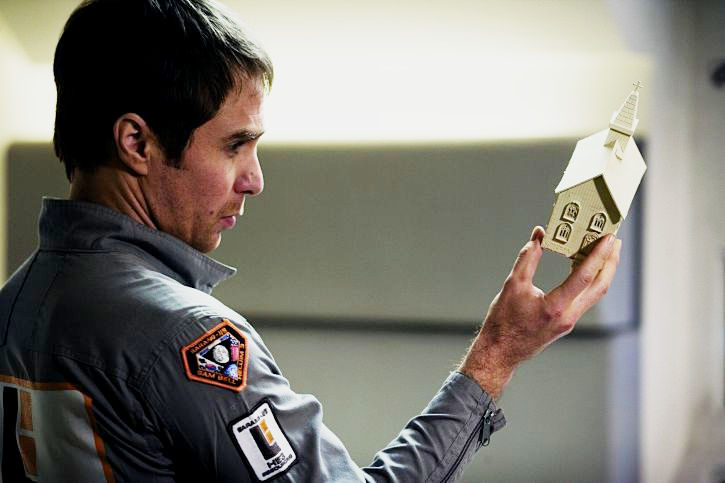
2. Moon: While Michael Bay, McG and their ilk tried to top each other with gimongous explosions this summer, Duncan Jones’ moody, low-key Moon just aimed to blow our minds. A throwback to the seventies big-think sci-fi that has fallen out of favor in the post-Star Wars-era, Moon‘s big special effect, other than Sam Rockwell, of course, was its clever ideas. And in a year of hit-or-miss (mostly miss) blockbusters, Rockwell’s quiet two-man show turned out to be the sci-fi extravaganza of 2009.
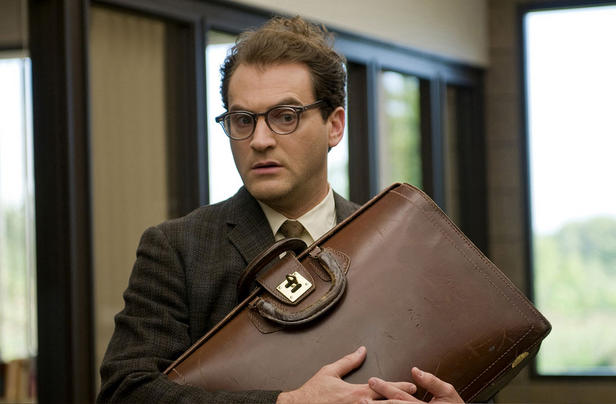
3. A Serious Man: Oy vey. This existential disquisition into wandering dybbuks, sixties Judaica, quantum mechanics, and Old Testament justice was yet another triumph for those devilishly talented brothers from Minnesota. The Job-like travails of Larry Gopnik introduced us to several colorful, Coenesque personages (Sy Ableman, Rabbi Nachtner) and offered vignettes (the Goy’s Teeth) and quotable philosophy (“Receive with simplicity everything that happens to you“) that cinephiles will ponder for awhile to come. The Coens abide.
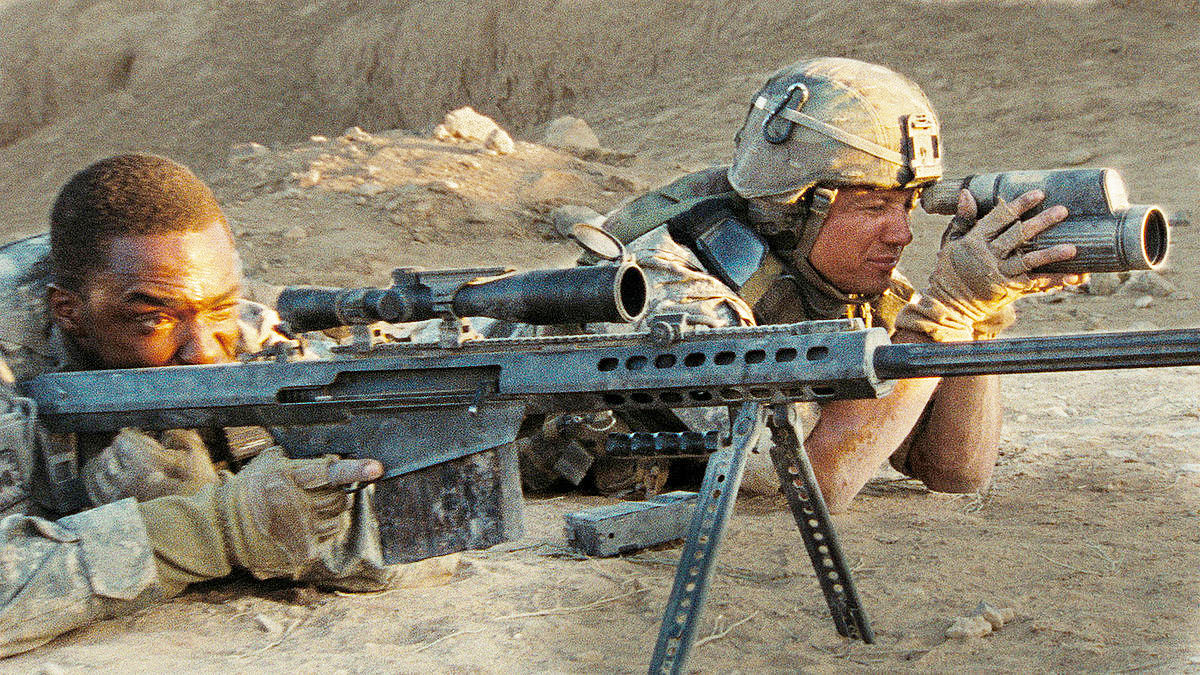
4. The Hurt Locker: Bombs away, and we’re not ok. Other than Modern Warfare 2 and Generation Kill, this immersive, nail-biting account of an IED team’s travails in the midst of the suck was the best pop culture simulator out there for feeling embedded in Iraq…and stuck at the wrong Baghdad street corner at just the wrong time. And with the tension ratcheting to uncomfortable levels in each of the ordnance disposal scenes, Kathryn Bigelow’s The Hurt Locker — sorry, King of the World — was the action movie of the year.

5. Coraline: In an auspicious year for both regular (see #10) and stop-motion (see #13) animation, Henry Selick’s adaptation of Neil Gaiman’s Coraline was the pick of the litter. It sorta got lost in the early-year shuffle, but Selick & Gaiman’s dark, twisted fairy tale delivered the goods, and hopefully it’ll find more life on DVD.
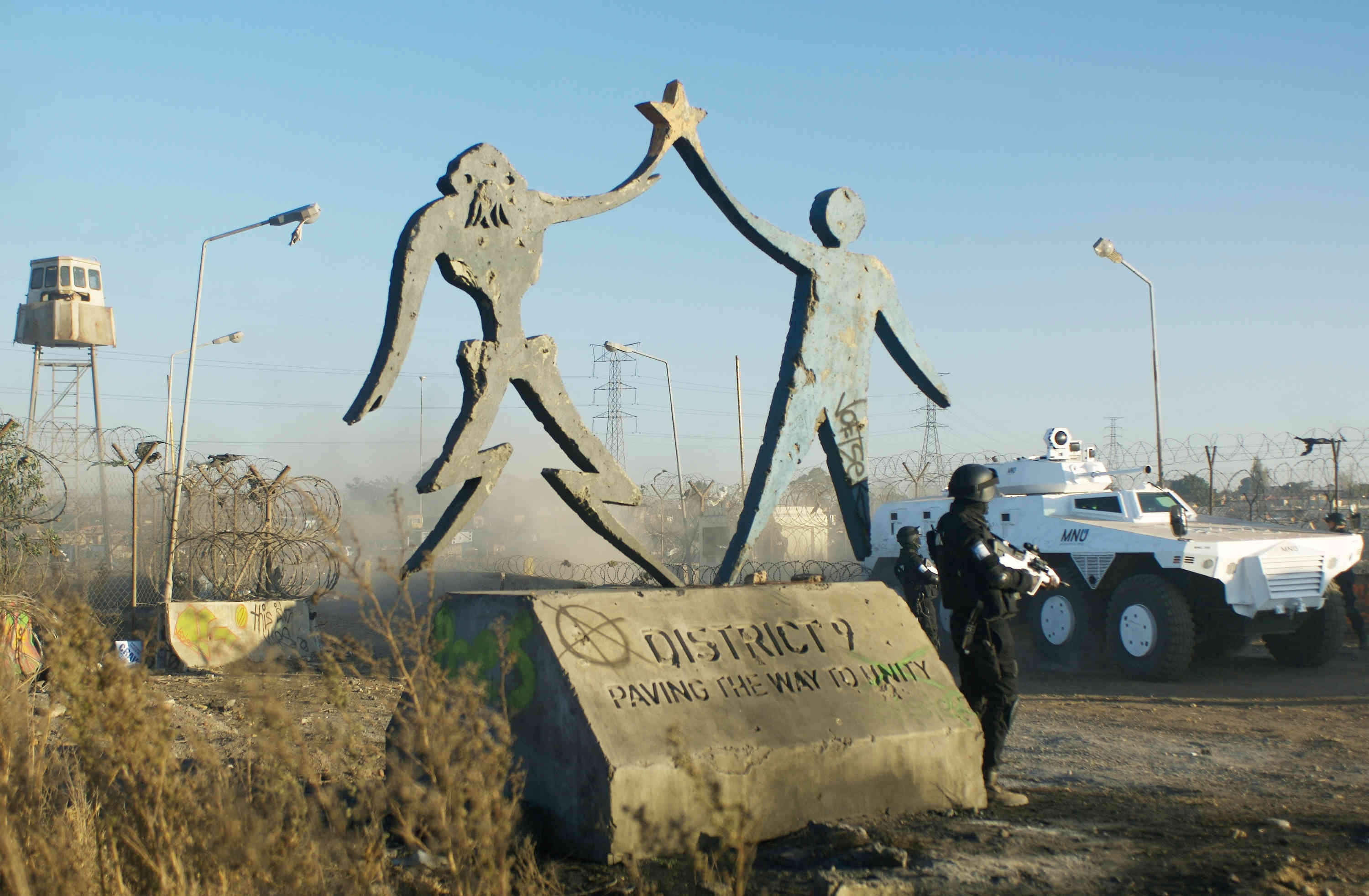
6. District 9: For those who find Moon a little too talky and slow, I direct you to Neil Blomkamp’s little (ok, $30 million) South African indie that could. Alien Nation meets Cry Freedom with healthy dollops of Cronenberg body horror and old-school Peter Jackson viscera-splatter, District 9 came out as more than the sum of its parts, and (with #8) was one of the most purely enjoyable films of the summer.
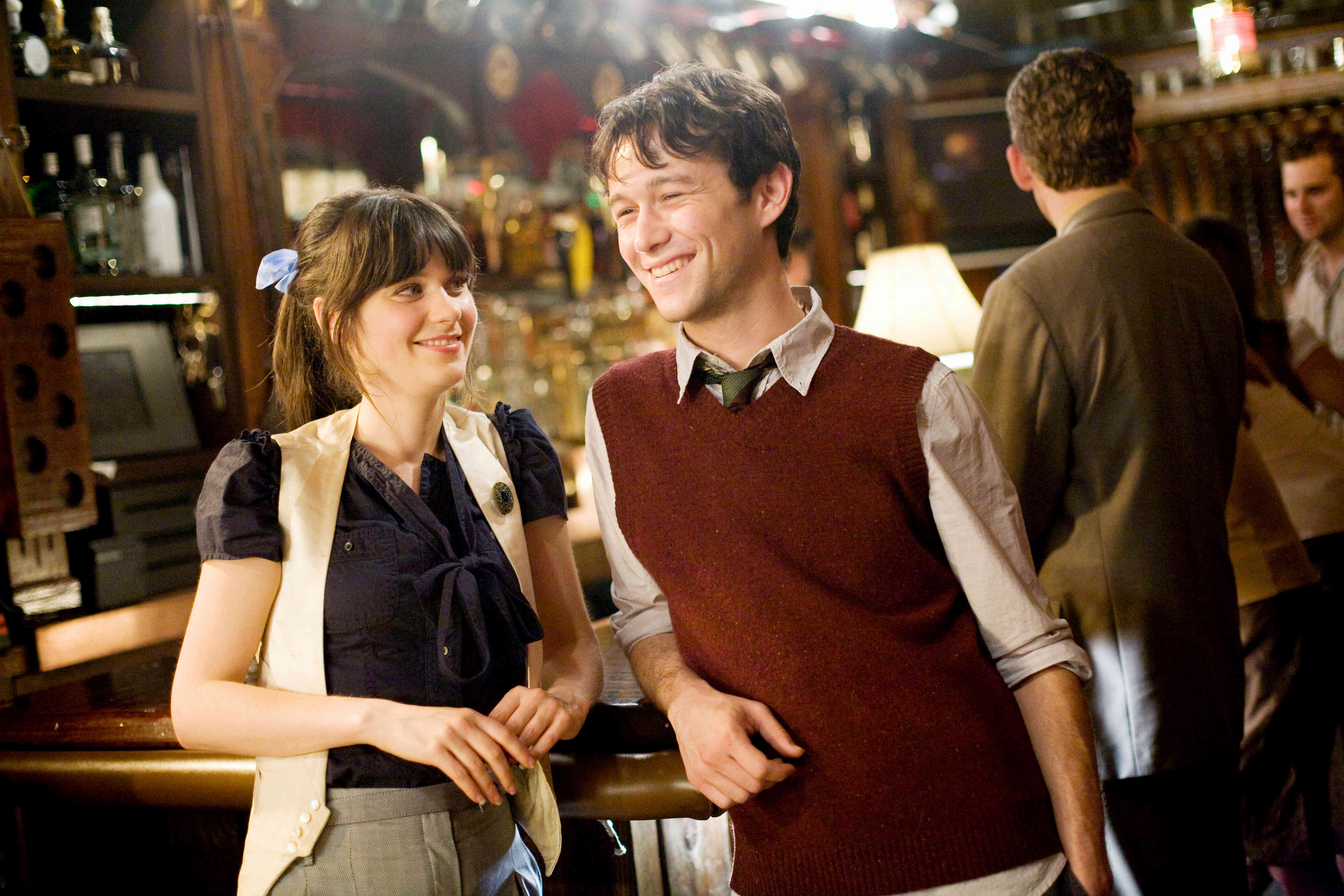
7. (500) Days of Summer: “This is a story of boy meets girl. The boy, Tom Hansen of Margate, New Jersey, grew up believing that he’d never truly be happy until the day he met The One. This belief stemmed from early exposure to sad British pop music and a total mis-reading of the movie ‘The Graduate’.” Speaking of said music, here’s a movie the early Elvis Costello would love. Sure, (500) Days is unabashedly for folks who’ve been on the wrong end of a break-up. But, even if it is ultimately Annie Hall-lite in a lot of ways, it had more truths to tell than most of the rom-coms out in any given year…combined.

8. Drag Me to Hell: Shaking off the Spidey 3 doldrums, Sam Raimi went back to his gross-out Evil Dead roots for this carnival concoction. Besides being easily the most explicitly anti-gypsy film since Borat, Drag Me to Hell was also, in its own way, as much of a Great Recession cautionary tale as Up in the Air. One hopes that when the Senate takes up financial services reform next year, our erstwhile reformers in that esteemed body will note what happened to Alison Lohman when she, against all better judgment, decided to do the bidding of the Banks.

9. Star Trek: There was admittedly a whole lotta stupid in J.J. Abrams’ Star Warsy revamp of the Star Trek franchise — Once exposed to the light, the movie’s basic premises completely fall apart. But, like the stomachache that accompanies eating too much candy, those regrets come later. In the moment, Star Trek was more fun than you can shake a stick at, and as solid and entertaining a franchise reboot as 2006’s Casino Royale. Let’s hope The Revenge of Khan or whatever it’s called turns out better than Quantum of Solace.
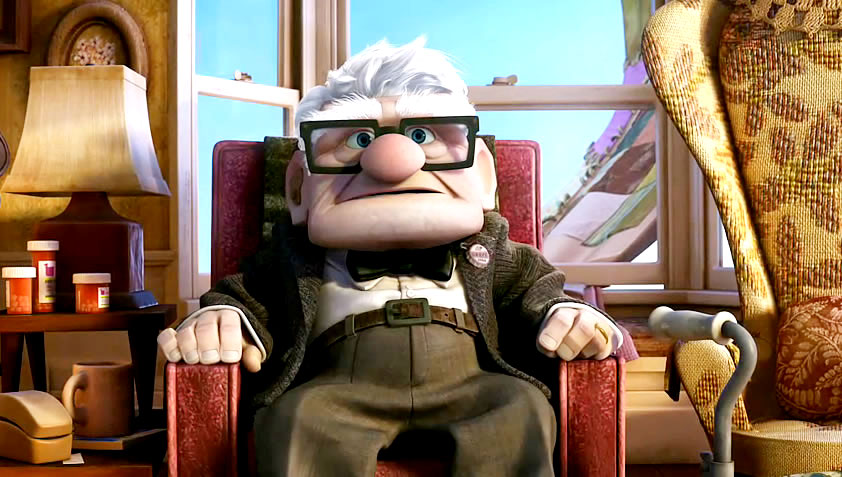
10. Up: If the movie were just the first ten-fifteen minutes, this might’ve been in the top five. But even more than WALL-E, the good stuff in Up is front-loaded. And, after the story of a lifetime ended a quarter hour in, I wasn’t much in the mood for talking dogs and big, funny birds (even birds named Kevin) anymore. Still, Pixar is Pixar, and Up carried their usual mark of quality.

11. The Damned United: Frost/Nixon for the futbol set, Tom Hooper’s ballad of Clough and Revie was a low-key character study that made up for an awkwardly-frontloaded bromance with another great performance by Michael Sheen and plenty of “Life in a Northern Town” local color to spare. You can practically smell the mud off the cleats in this one.

12. Duplicity: Perhaps I’m giving too many props to well-made breezy entertainments this year (see also Nos. 8 & 9). Nonetheless, Tony Gilroy’s Duplicity was a sleek espionage caper and a decently sexy love story that was all the more amusing because the stakes were so small. As it turns out, Clive Owen had just taken on evil corporations with a global reach a few weeks earlier in The International (a movie I caught on DVD, and which was most memorable for its Gunfight in the Guggenheim) — He’s more fun when he’s on the payroll.
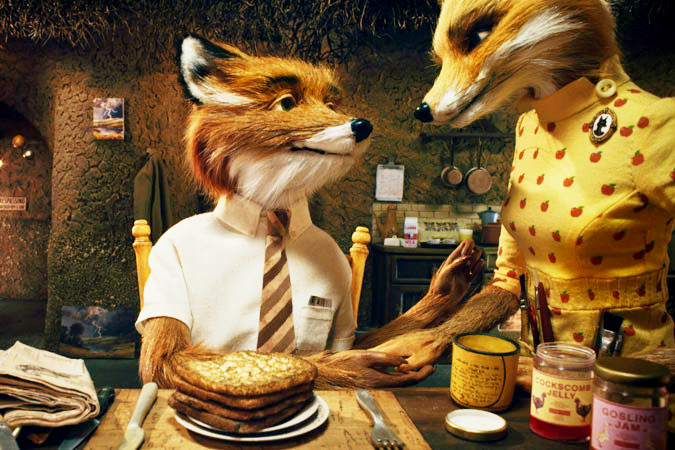
13. The Fantastic Mr. Fox: If you see one clever stop-motion adaptation of a sardonic children’s novel this year…well, see Coraline. Nonetheless, The Fantastic Mr. Fox was also one of the better entrants in the 2009 line-up. It was ultimately a little too Wes Anderson saccharine for my tastes, but, of course, your mileage may vary. And at least Fox didn’t wallow in the emo like, you know.
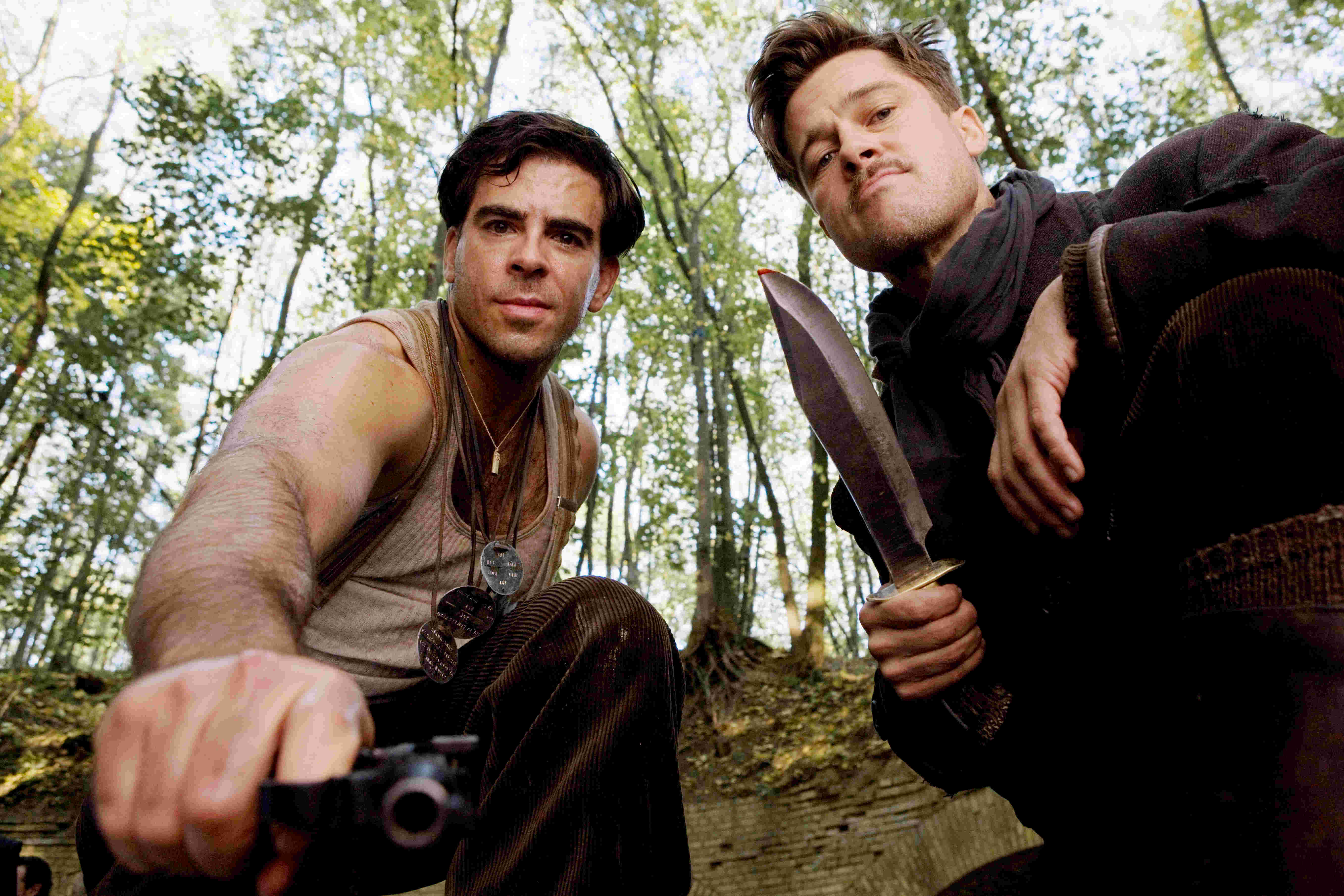
14. Inglourious Basterds: After a decade of languishing in the shallows, Quentin Tarantino found a bit of his old magic in this sprawling alternate history of WWII. Yes, it needed a good and ruthless editor, and some rather longish scenes don’t really work at all (I’m thinking mainly of Shoshanna’s lunch with Goebbels and Linda.) But at certain times — the basement cafe snafu, for example, or the memorable finale — Basterds is the best thing QT has done since Jackie Brown. Let’s hope he stays in form.
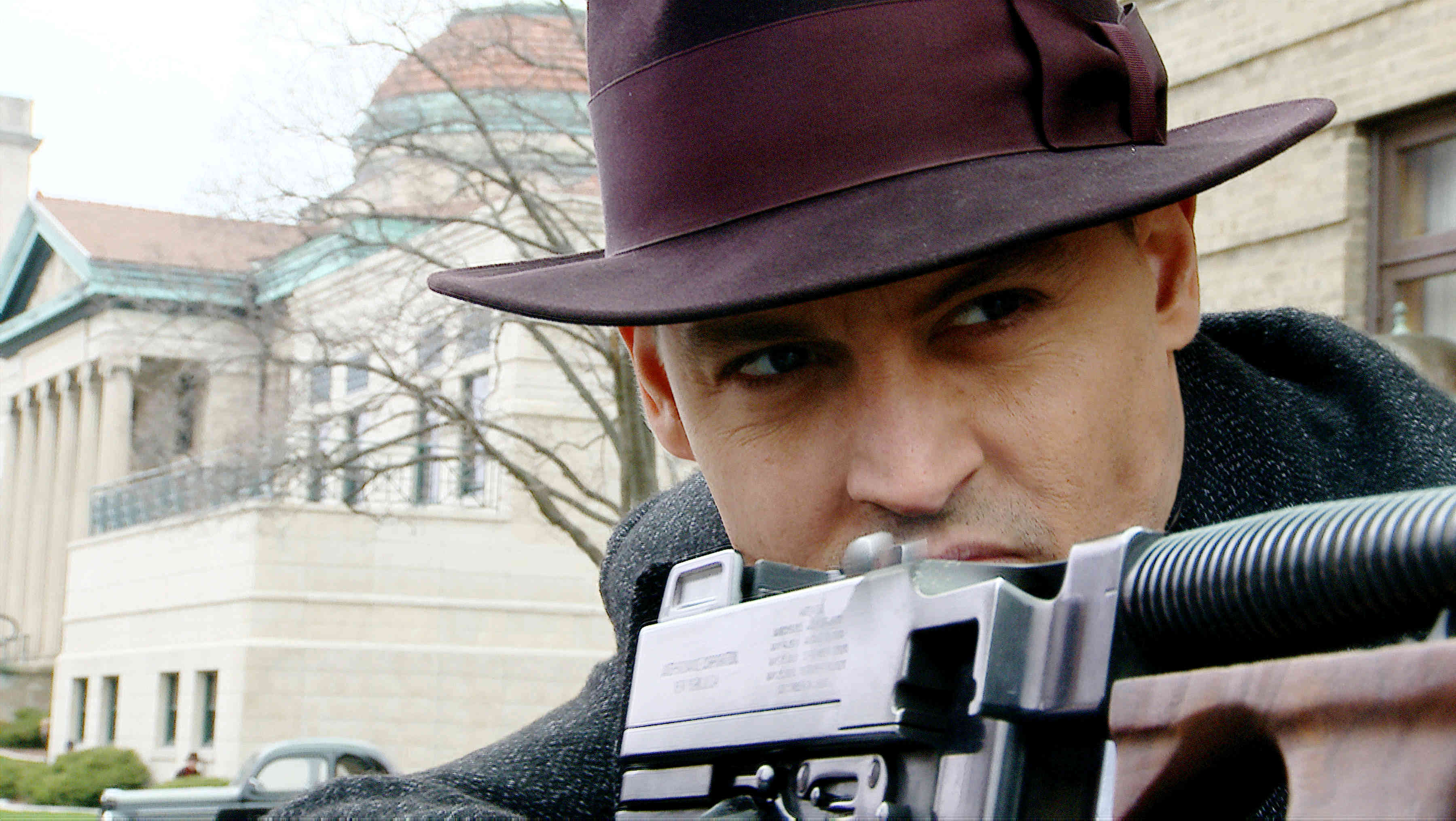
15. Public Enemies: Michael Mann’s high-def retelling of The Last Days of Dillinger was a strange one, alright. Like Basterds, it was long and languid and sometimes seemed to move without purpose. But, like Mann’s last grainy-digital foray into tales of manly men and the women they love, Miami Vice, Public Enemies has stuck with me ever since. Say what you will about the hi-def video aesthetic, it somehow seems to match Mann’s haunted, Hemingwayesque sense of poetry.
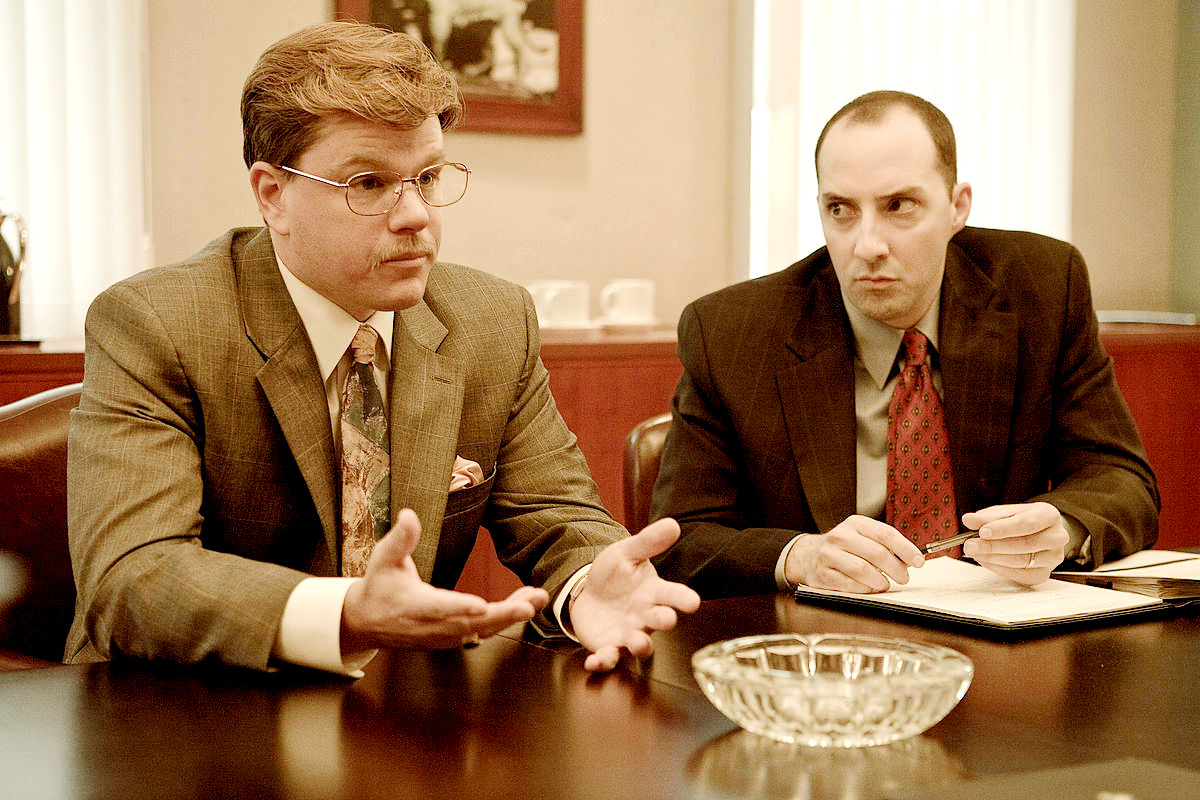
16. The Informant!: The tragedy of The Insider retold as farce, The Informant!, like many of Steven Soderbergh’s films, was experimental in a lot of ways. Some things worked (the ADM-buttery sheen); Others didn’t (the distractingly peppy Hamlisch score); Others still were hit-or-miss (the in-head bipolar voiceover). Nonetheless, The Informant! is mostly a success, and it’s good to see Soderbergh out there trying new things — I wish I’d gotten around to catching The Girlfriend Experience. (Ahem, the movie, that is. Sheesh, some people.)
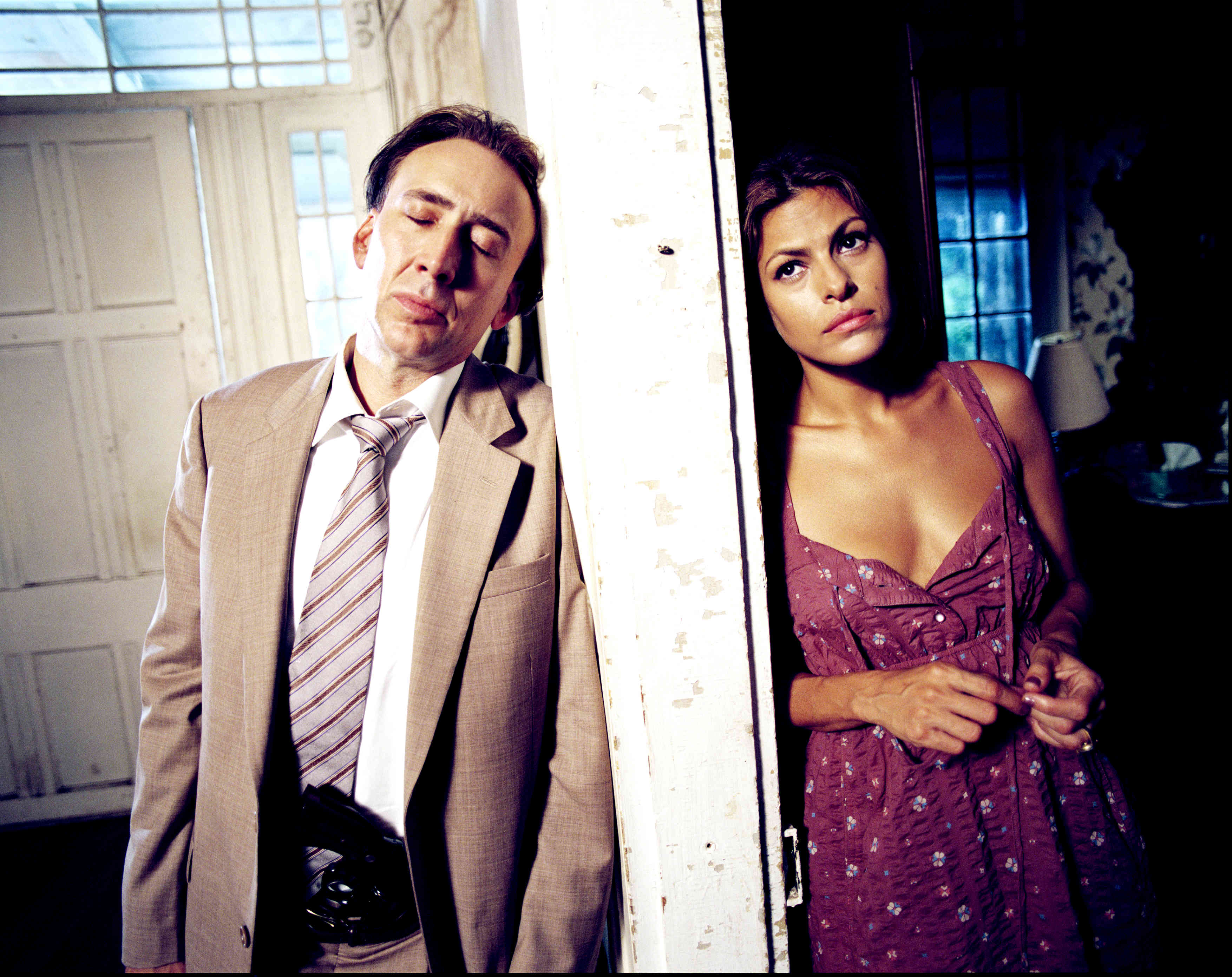
17. Bad Lieutenant: Port of Call New Orleans: I had definite doubts going in, but Werner Herzog’s Grand Theft Auto: New Orleans turned out to be a surprisingly fun gonzo trip. After years of hanging with the Kinski, good ole Werner sure knows his way around the crazy, and by pairing Nicholas Cage on a savage burn with hyperreal iguanas, voodoo breakdancers, and the like, he’s done Abel Ferrara’s Gloomy Gus version of this tale one better. There’s no Catholic angst for this Lieutenant — just reveling in sordidness…but then again, isn’t that the whole point of Carnival?
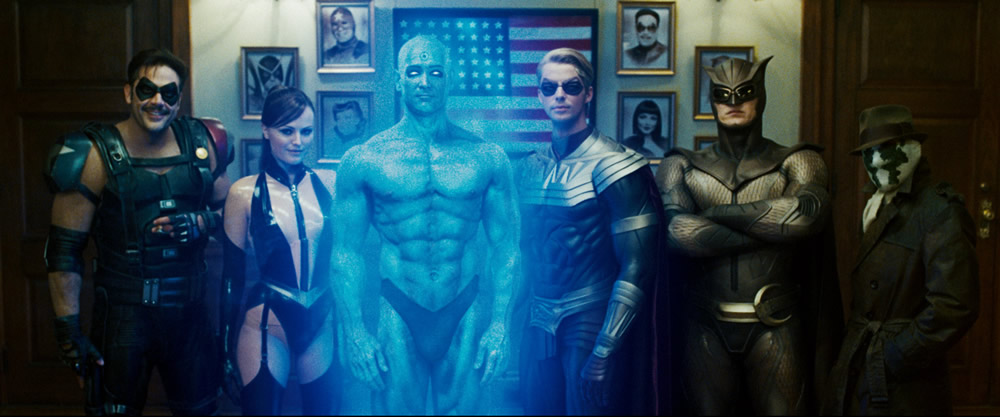
18. Watchmen: “At midnight, all the agents and the superhuman crews go and round up everyone who knows more than they do.” True, Zack Snyder’s attempt to recreate the Alan Moore graphic novel on film is flawed in a lot of ways. (The longer DVD version smooths out some of these issues while introducing others.) And I still wish the project had stayed in Paul Greengrass’ hands. But, give credit where it’s due — For all its many problems (most notably the fratboy-indulgences into “cool” violence), Snyder’s Watchmen got a lot of things right, from Dr. Manhattan sulking on Mars to Jackie Earle Haley’s turn as Rorschach. Snyder couldn’t match the degree of difficulty involved in the end, but Watchmen was still a worthy attempt.
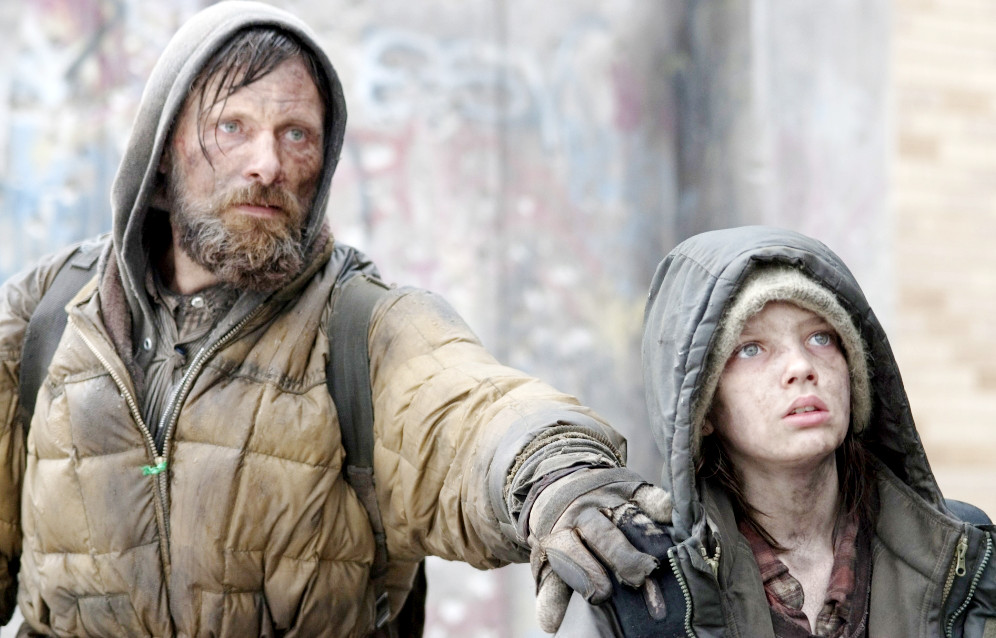
19. The Road: In the Future, There Will Be Cannibals: John Hillcoat’s film version of Cormac McCarthy’s dabbling in the apocalyptic form definitely captured the resonances of the book. And this is a quality production through and through, with solid performances by Viggo, the kid, Charlize Theron, and all of the HBO All-Stars (with particularly big ups to Robert Duvall.) Unfortunately, I didn’t think much of the book either, and in its monochromatic grimness, The Road never seems as memorable as Hillcoat’s earlier film, The Proposition. All work and no play makes Hobo Viggo somethin’ somethin’.
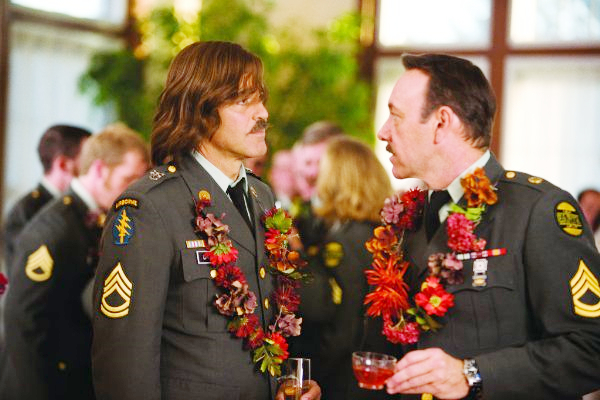
20. The Men Who Stare at Goats: I’m sure a lot of lists would’ve found room for Avatar or Up in the Air in their top twenty, and both have their merits (even if Avatar‘s are almost completely technical.) But if Avatar was too flat and Air too glib, The Men Who Stare at Goats was a frothy excursion that delivered on basically the terms it promised at the onset. Ok, there’s not much there there, but sometimes a couple of likable actors having an extended goof will go farther than Big, Oscar-Worthy Messages and World-Beating Tech. Hmmm, if you think about it, the “sparkly eye” technique probably would’ve gone over better with the Na’vi than all those Aliens-loaned cargo-loaders anyway. Score one for the First Earth Battalion.
Most Disappointing: Where the Wild Things Are, Terminator: Salvation
Worth a Rental: An Education, Avatar, Cold Souls, Eden (2006), Harry Potter and the Half-Blood Prince, The International, Paranormal Activity, Sherlock Holmes, A Single Man, Taken, Up in the Air, Zombieland
Don’t Bother: 2012, The Box, The Brothers Bloom, Extract, A Girl Cut in Two (2006), The Hangover, Invictus, Jennifer’s Body, State of Play, The Tiger’s Tail (2006), Whip It, World’s Greatest Dad
Best Actor: Sam Rockwell, Moon; Jeremy Renner, The Hurt Locker
Best Actress: Carey Mulligan, An Education
Best Supporting Actor: Christoph Waltz, Inglourious Basterds; Robert Duvall, The Road
Best Supporting Actress: Marion Cotillard, Public Enemies; Melanie Laurent, Inglourious Basterds
Unseen: 9, Nine, Adventureland, Angels & Demons, Amelia, Antichrist, Armored, Astro Boy, Black Dynamite, Blood: The Last Vampire, Bright Star, Brothers, Bruno, Capitalism: A Love Story, Cirque du Freak: The Vampire’s Assistant, Crank: High Voltage, Crossing Over, Everybody’s Fine, Funny People, Gentlemen Broncos, GI Joe, The Girlfriend Experience, Good Hair, The Education of Charlie Banks, The Great Buck Howard, Hunger, The Imaginarium of Doctor Parnassus, The Invention of Lying, It’s Complicated, Julie & Julia, Land of the Lost, The Limits of Control, , The Lovely Bones, I Love You Man, Me and Orson Welles, The Messenger, New York I Love You, Notorious, Observe & Report, Orphan, Pandorum, Pirate Radio, Ponyo, Precious, The Private Lives of Pippa Lee, The Proposal, Push, The Soloist, Surrogates, The Taking of Pelham1-2-3, Taking Woodstock, Thirst, The Time Traveler’s Wife, Transformers: Revenge of the Fallen, The Twilight Saga: New Moon, Two Lovers, The Ugly Truth, Whatever Works, X-Men Origins: Wolverine, Year One
2010: Alice in Wonderland, All Good Things, The American, The A-Team, The Book of Eli, Brooklyn’s Finest, Clash of the Titans, A Couple of Dicks, Daybreakers, The Expendables, Greenberg, The Green Hornet, Green Zone, Harry Potter and the Deathly Hallows Pt. 1, I Love You Phillip Morris, Inception, Iron Man 2, Jonah Hex, Kick-Ass, Knight & Day, The Last Airbender, Legion, The Losers, Percy Jackson & The Olympians: The Lightning Thief, Morning Glory, Predators, Prince of Persia: The Sands of Time, Red, Robin Hood, Salt, Season of the Witch, Shanghai, Shutter Island, The Sorcerer’s Apprentice, Toy Story 3, The Voyage of the Dawn Treader, Wall Street 2: Money Never Sleeps, The Wolf Man, Youth in Revolt, more needless ’80s remakes than you can shake a stick at. (Footloose, The Karate Kid, A Nightmare on Elm Street, Red Dawn), and…

TRON 2. 2010, y’all. It’s the future, and no mistake.
Hey all. So, this has turned out to be a rather massive undertaking, one that’s had to be split up into five parts so as not to destroy Movable Type. And, while the 2009 list hasn’t yet been posted (although I have written it, pending a few more films I expect to see in the next week, such as Sherlock Holmes and The Lovely Bones), I thought I’d go ahead and throw out the first installment of my promised Best-of-Decade list right now. A few caveats before I start:
1) This is my list, obviously. Meaning these are the movies I enjoyed, cherished, or otherwise been entertained by over the past decade. So, if you vehemently disagree, that’s cool, but that’s just like your opinion, (wo)man.
2) Movies are being judged — in part — on how well they succeed on their own terms. So, to take an example below, am I really saying that Drag Me to Hell (#79) is a better film than Brokeback Mountain (#80)? And I’m saying yes, it’s either [a] more entertaining or [b] to my mind, accomplishes better what it sets out to do.This way, a really funny Z-grade comedy might just beat out an expensively manicured piece of Oscar bait. Ya never know.
3) Since I’ve already posted extensive reviews of most of the movies here, I’ve gone ahead and included excerpts from those in the gray boxes for each film. Feel free to re-read or ignore these as you see fit.
4) Speaking of those reviews, some of the movies below may do better or worse than they did in their respective end-of-year lists. Some move up, some move down, such is the passage of time.
5) Finally, before we begin and in alphabetical order, some honorable mentions that didn’t quite make the top 100 list, with brief explanations:
|
And now, the real list. Here we go…
[The Rest of the List: 100-76 | 75-51 | 50-26 | 25-11 | 10-1]
[2000/2001/2002/2003/2004/2005/2006/2007/2008/2009]
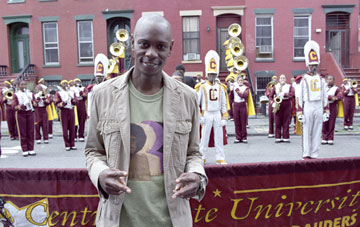
| From the original review: “[I]t’s hard to come up with a better ‘first-day-of-spring’ movie than th[is] wickedly funny, rousingly optimistic hip-hop concert flick…Block Party bounces with cool, infectious verve and power-to-the-people, DIY exhilaration…Chappelle’s wry irreverence and broad, encompassing good humor are contagious. Often, it seems, he can’t believe his luck at becoming the jester-king of Brooklyn for a day, and he grounds and permeates the film with his antic enthusiasm and sardonic, puckish charm.“
From the year-end list: “With performances by some of the most innovative and inspired players in current hip-hop (Kanye, Mos Def, The Roots, The Fugees, Erykah Badu), and presided over by the impish, unsinkable Chappelle, Block Party was one of the best concert films in recent memory, and simply more fun than you can shake a stick at.“ |
A case could be made that Michel Gondry’s Dave Chappelle’s Block Party should be even higher on this list — Few movie experiences of the decade were as out-and-out pleasurable as my spring afternoon viewing of this flick. That being said, Block Party seemed like a good way to kick off this best-of-decade list — It’s just a happy, goofy, groovy, fun movie, teeming with great music, optimism, and the open possibilities of any given day. Particularly if you have any affinity for hip-hop, give it a whirl.

| From the original review: “Well, that was a happy surprise. Star Wars Episode III: Revenge of the Sith is by no means a perfect film. But, the reviews are right — this one’s miles above the other two prequels, and definitely can be considered in the same breath as Jedi. Sure, there’s a bad movie occasionally lingering in the shadows like a Sith, but for the most part this entry manages to capture some of that ole Star Wars feel.“
From the year-end list: “Thank the Force for small kindnesses: George Lucas put the Star Wars universe to bed with far and away his best outing of the prequels. The film flirts dangerously with the Dark Side, particularly in the ‘let’s take a meeting’ second act, but for the most part Sith felt — finally — like a return to that galaxy long ago and far, far away.“ |
How George got his groove back. In a perfect world, the Star Wars prequels would’ve carried some of the vim and verve of Peter Jackson’s LotR trilogy or the first Matrix. Alas, as you all know, that didn’t happen. Like many SW fans of my generation, I walked out of 1999’s middling The Phantom Menace confused about where George Lucas was intending to go with all this, and desperately trying to convince myself that, Jar Jar Binks, midichlorians, and pod racing notwithstanding, I’d just sat through a really good movie. (The still-very-good Maul/Obi-Wan/Qui-Gon duel helped a good bit with the denial.)
Alas, the atrocious Attack of the Clones of 2002, the pre-Clone Wars nadir of the Star Wars franchise (Holiday Special notwithstanding), put that reverie to bed. Something terrible had happened — disastrous, even. All across America, millions of fanboy and fangirl voices suddenly cried out in terror and were suddenly silenced.
But, with expectations suitably lowered, then came Sith in 2005, which at least carried some small glimmers of the old magic. I won’t try to defend the film’s many faults — they’re there, all right. But every so often during Sith, you could feel something, as if Lucas had finally managed to take his first step back into a larger world.

| From the year-end list: “A little slower than I would have liked, and it had no second act, but this languid, contemplative film spoke to the comic fan in me.“ |
It seems weird from the perspective of 2009, after drek like Signs and The Village. (I didn’t see Lady in the Water or The Happening, but…I’ve heard bad things). Nonetheless, back in 2000, M. Night Shyamalan still seemed like he had the potential to be a first-rate genre filmmaker, maybe even the new Spielberg. True, 1999’s The Sixth Sense ended up being massively overhyped — Due mainly to box office, one presumes, it even bypassed The Matrix, Being John Malkovich, Three Kings, and Fight Club for an Oscar nod. But it still came out of nowhere to make for a surprising and unsettling ghost story that year.
And, belying the usual curse (that would come later, in spades), Shyamalan turned out a quality sophomore follow-up in Unbreakable. I haven’t seen the movie since it came out, but I still remember it as a unique take on the superhero origin story in a decade that would be full of them. True, the Mr. Glass monologuing at the end should have telegraphed to us Shyamalan’s overreliance on the 11th-hour plot twist. But that wouldn’t really come to seem a problem until later films. As it was, Unbreakable showed that M. Night wasn’t afraid to follow-up a box-office monster with a movie that felt quite different in tone, and it suggested — probably wrongly, it turns out — that he might have a few more tricks up his sleeve after “I see Dead People.”
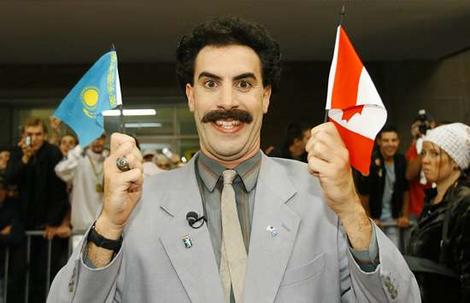
| From the original review: “I don’t really feel the inclination to write the usual three-paragraph review for Borat…so I’ll just leave it at this: It’s really funny…[U]nless you’re offended by ridiculously over-the-top anti-semitism or have a problem with truly grotesque displays of male nudity, you should find it verrry nice. (But leave the gypsys at home.)“
From the year-end list: “True, the frighteningly talented Sasha Baron Cohen spends a lot of time in this movie shooting fish in a barrel, and I wish he’d spent a little more time eviscerating subtler flaws in the American character than just knuckle-dragging racists and fratboy sexists. Still, the journeys of Borat Sagdiyev through the Bible Buckle and beyond made for far and away the funniest movie of the year.“ |
The Cotton Kingdom of the Dubya era. I had this quite a bit further up the list at first, but decided to switch it out with one of its memorable antecedents. (More on that demented travesty later.)
I missed Bruno this year, so I don’t know how it compares. Still, Borat has slipped quite a bit from its 2006 ranking, if only because [a] I’m not sure a lot of the comedy holds up on repeat viewings, and [b] I still think Cohen went for mostly easy targets here. In its picking off the low-hanging fruit in the Red States — bible-thumpers, rednecks, and whatnot — the movie also feels very much an artifact of the post-2004 election grimness. Although, now that I think about it, a strong case could be made that Cohen was just prepping us for the teabagger vanguard.

| From the original review: “All in all, very well done, and a battered, despairing Michael Caine deserves an Oscar for this much more than he ever did for his turn in the schlocky Cider House Rules.“
From the year-end list: “A bit by-the-numbers, perhaps, but Phillip Noyce’s take on Graham Greene’s novel was blessed with timeliness and two great performances by Michael Caine and Brendan Fraser, both of whom expertly exemplified their homelands’ diplomatic tendencies without becoming overly tendentious.“ |
I watched about half an hour of The Quiet American again a few weeks ago while flipping through the channels, and I still think it has a bit too much of an austere, “from-the-classic-novel” feel to it, the sort of movie one might be forced to watch in a high school class (be it English or History). Still, it’s very well-done, Caine and Fraser are both exceedingly well cast, and you could do worse as a quality intro to our blundering in Vietnam than Graham Greene’s ripe and pungent allegory here.
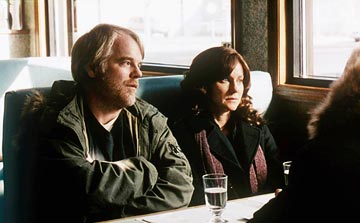
| From the original review: “[W]hat Six Feet Under is to dying, The Savages is to the final stages of aging. It’s something we don’t really want to think about, but it’s there, somewhere over the last ridge. If we’re going to dwell on this subject, it’s probably best to confront that fact with the mordant humor of [this film] (while keeping in mind that, however inevitable that final end, it’s never too late to teach an old dog some new tricks.)“
From the year-end list: “[F]ew other movie endings this year hit me in the gut quite like this one…[T]his comedy about an ornery lion in winter, and the battling cubs who have to come to his aid, is a worthwhile one, and particularly if you’re in the mood for some rather black humor. As Lenny the senescent and slipping paterfamilias, Philip Bosco gives a standout performance, as does Hoffman as the miserable Bertholdt Brecht scholar trapped in deepest, darkest Buffalo.“ |
Tamara Jenkins’ The Savages is an uneven film, and at times it gets overwhelmed by its televisionish tendencies (be they sitcom or Lifetime movie-of-the-week-oriented.) But when it’s on, it’s on, and it’s a film that’s stuck with me in the two years since I caught it on the back-end of an Angelika double-bill (along with another mortality-drenched movie further down the list.) I still have some issues with its Bagger Vancing of The Wire‘s Gbenga Akinnagbe, but in its depictions of siblings, senescence, and seriously bummed-out academics, The Savages rings true.
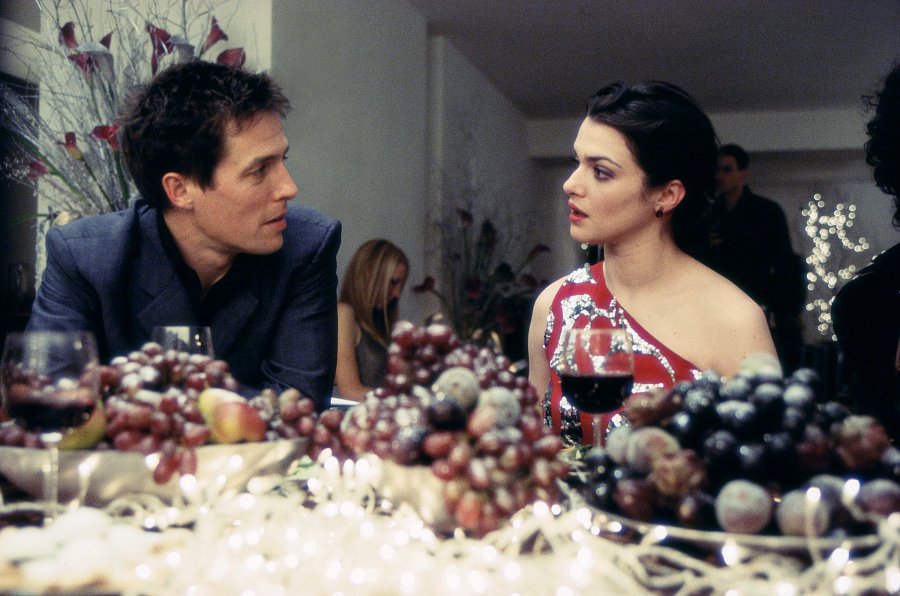
| From the original review: “[W]hile it was quite good for its genre (and Hugh Grant was surprisingly palatable), I do have some problems with its underlying premises…Since when is one’s identity primarily formed by holding down a job you hate?…I don’t remember the protagonist of Hornby’s book being nearly so shattered by his presumed nothingness.“
From the year-end list: “A surprisingly good translation of Nick Hornby’s third book. A bit fluffy, perhaps, and…I’m not sure how I feel about some of the underlying premises, but very well done nonetheless. After all, making both Hugh Grant and a precocious young British lad palatable at the same time is no easy task.“ |
Now this one to me is almost exactly the opposite of The Savages, in that — more than any other film on this list — I can barely remember About a Boy at all, other than Toni Collette being very good, the kid (Nicholas Hoult, soon of A Single Man and Clash of the Titans) also being quite solid, and Hugh Grant singing acapella, drinking a lot of Red Bull, and somehow magically not getting on my nerves. And because of this memory hole, I came very close to putting another very similar-feeling Weitz production, In Good Company, here instead. But just because the high has mostly evaporated doesn’t mean the initial experience wasn’t grand. So I’m trusting my notes here somewhat (which had About a Boy at #3 for 2002) and putting it here at #94. Hopefully, I know what I’m talking about.
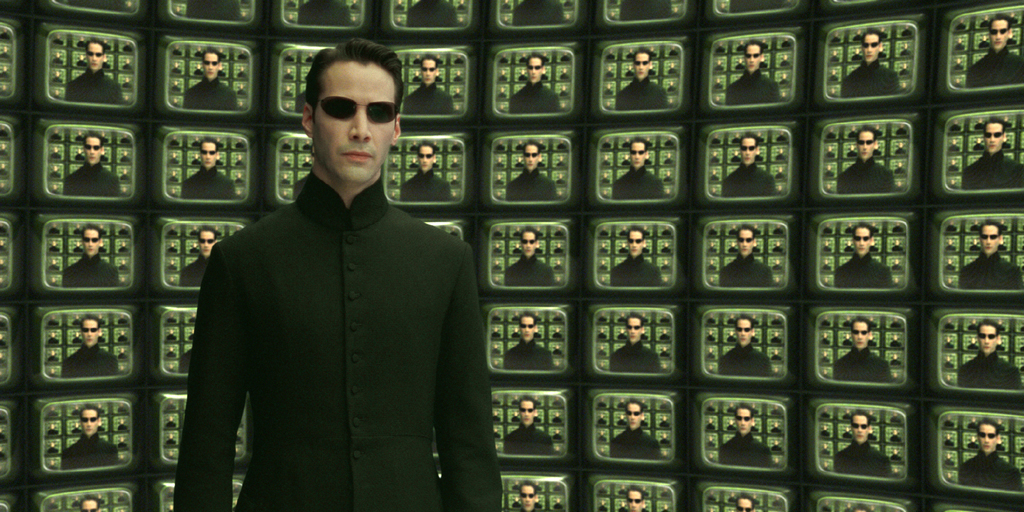
| From the original review: “To be sure, the first forty minutes of the film, including everything that takes place in Zion, is almost unwatchable…But, right about the time Neo gets a call from the Oracle and reenters the Matrix in Chinatown…the film finally starts to find its rhythm…Alas, Neo and Trinity still don’t really work as an onscreen couple, but most of the action setpieces are breathtaking (particularly the highway chase and truck fight…in the midst of all the new characters showing up, it’s nice to see the Agents still getting their due.) And as expected, Hugo Weaving is just wicked good fun as Agents Smith…they steal every scene they’re in.“
From the year-end list: “I won’t defend the first forty-five minutes or the ridiculous rave scene. But, right about the time Hugo Weaving showed up to do what he does best, Revolutions found a new gear that it maintained right up until the arc-twisting Architect monologues at the end. And, as far as action sequences go, it’s hard to beat the visceral thrill of the 14-minute highway chase.“ |
I can envision getting some grief for this one, but what I said in these two reviews stand. As a whole, this first sequel to 1999’s The Matrix has serious problems in its first hour — I’m looking at you, Bacardi-Benetton rave. But once you get to the (now rather dated looking) “Burly Brawl,” (i.e. Neo vs. a legion of Smiths) The Matrix: Reloaded kicks it up a notch.
Sure, nothing could match the initial shock of seeing Neo wake up in that gooey biopod in the first movie — That was the first indicator that the heretofore unknown Wachowski brothers (Bound notwithstanding) were really playing on a broad canvas here. But from the Burly Brawl on — through the Merovingian and Swiss Chalet stuff, the albino Milli Vanilli twins, the highway chase, and on to the Architect’s rambling in the final moments, Reloaded is easily as propulsive and occasionally mind-bending as the second half of the first film. (And, without a doubt, it’s far better than the woeful Matrix: Revolutions, out later that year.)
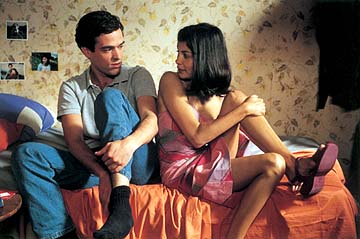
| From the original review: “L’Auberge was funnier, sexier, and more intelligent than any of the assorted American Pies or their ilk…This movie seems to understand that it’s possible to capture the joys of youth and friendship without resorting to a constant stream of lame, mostly unfunny gross-out jokes.“
From the year-end list: “[W]hile Lost in Translation trafficked in existential detachment, L’Auberge Espagnole showed the fun Scarlett Johannson could’ve been having, if she’d just lighten up and get out of the hotel once in awhile. This paean to the pan-Continental culture of the EU captured the excitement and possibilities of youth in a way that was both sexier and funnier than any of the teen shock-schlock emanating from our own side of the pond. Road Trippers, take a gander.“ |
Now, having roundly derided domestic gross-out comedies, I should say that I just came very close to pulling an audible and putting the very funny Harold & Kumar Go to White Castle in this spot. (Sorry guys, you got screwed. A few Sliders should help ease the pain.) Nonetheless, L’Auberge Espagnole is a jaunty European escapade that matched the sexy frankness of Y Tu Mama Tambien (minus its existential pretensions — remember that goofy car crash?) with the joy and possibility of foreign travel you find in, say, Before Sunrise. I remember seeing this flick on a dismal Match.com date, and even that couldn’t diminish the experience. Salut.
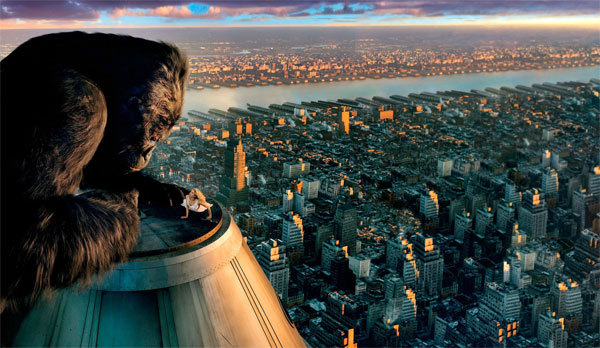
| From the original review: “In essence PJ’s King Kong is the Mother of All B-Films — the Skull Island action sequences are spectacular, Kong’s adventures in New York seem appropriately mythic, the special effects throughout (particularly the Great Ape himself) are mind-blowing…[But] the film has some serious pacing problems, particularly in the first hour, and at times I thought it seemed almost too reverent of its source material. At the very least, Kong, while definitely a Wonder of the World and no mistake, could have benefited from some minor grooming.“
From the year-end list: “I had this film as high as #2 for awhile, and there are visual marvels therein that no other movie this year came close to offering, most notably Kong loose in Depression-Era New York City. But, there’s no way around it — even given all the B-movie thrills and great-ape-empathizing that PJ offers in the last 120 minutes, the first hour is close to terrible, which has to knock the gorilla down a few notches.“ |
Yep, that about covers it. Like The Matrix: Reloaded a few spots ago, King Kong is an eye-popping visual feast that ultimately falls several steps shy of greatness thanks to all the excess baggage on the front end. I don’t have much of an attachment to the 1933 version (or the 1976 Jeff Bridges/Jessica Lange/Charles Grodin version for that matter, although Lange looks stunning in it), but almost all of the Kong-in-NYC stuff in PJ’s version is marvelous, give or take the ice-skating, and feels like something ripped from the pages of myth.
That being said, it feels like we’re on Skull Island for a really long time in this Kong, and that doesn’t even get into all the deadly dull happenings before they even reach the King’s domain. For all its strengths, this Kong is too self-indulgent to go down as one of the decade’s greats. It’s clearly a labor of love by PJ (and he earned it after knocking LotR out of the park), but the movie would’ve benefited from quite a bit more tough love at some point in the process.
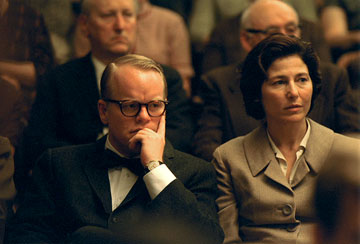
| From the original review: “[A] somber and compelling character study of the eponymous author…Hoffman’s Capote cuts a complex and striking figure that’s hard to take your eyes from — He’s at once vainglorious and needy, extroverted and remote, compassionate and manipulative, convivial and detestable.“
From the year-end list: “I think it’d be awhile before I want to watch this movie again, but, still, it was a dark, memorable trip into bleeding Kansas and the writerly id.” |
“Every artist is a cannibal. Every poet is a thief. All kill their inspiration and sing about their grief.” In fact, I haven’t seen Capote since it came out in 2005 (nor did I ever see Infamous, with the Trumanesque Toby Jones.) But the moral darkness of this film lingers, as does Clifton Collins, Jr.’s haunting portrayal of Perry Edward Smith, who, to Capote, is both the Spider and the Fly.

| From the original review: “Blessed with a charismatic and appealing cast that smooths over much of the choppy writing turbulence therein, Abrams’ Trek reboot isn’t only a rousing, over-the-top, sometimes patently absurd space opera that borrows as much from Lucas’ original trilogy as it does from its erstwhile source material — It’s also probably the best of the Star Wars prequels. The more I’ve thought about it over the past few days, the less sense the movie makes, and the more and more shamelessly derivative Trek seems. But darned if I didn’t have a good time during the Big Show itself, which, of course, is what really matters in the end.“
From the year-end list: “There was admittedly a whole lotta stupid in J.J. Abrams’ Star Warsy revamp of the Star Trek franchise — Once exposed to the light, the movie’s basic premises completely fall apart. But, like the stomachache that accompanies eating too much candy, those regrets come later. In the moment, Star Trek was more fun than you can shake a stick at, and as solid and entertaining a franchise reboot as 2006’s Casino Royale.“ |
Sure, it’s a cotton candy movie, but, like I said, Star Trek had more of that Star Wars magic than any of the prequels, including Sith. I haven’t seen Trek again since that first time in the theater, and it’s entirely possible a lot of the general dumbness of the movie — Spock hanging ’round the ice cave, all the nonsensical red matter/black hole stuff — will weigh everything down more on a second viewing. Still, it was definitely fun that first go. Bring on Javier Bardem as Khan.
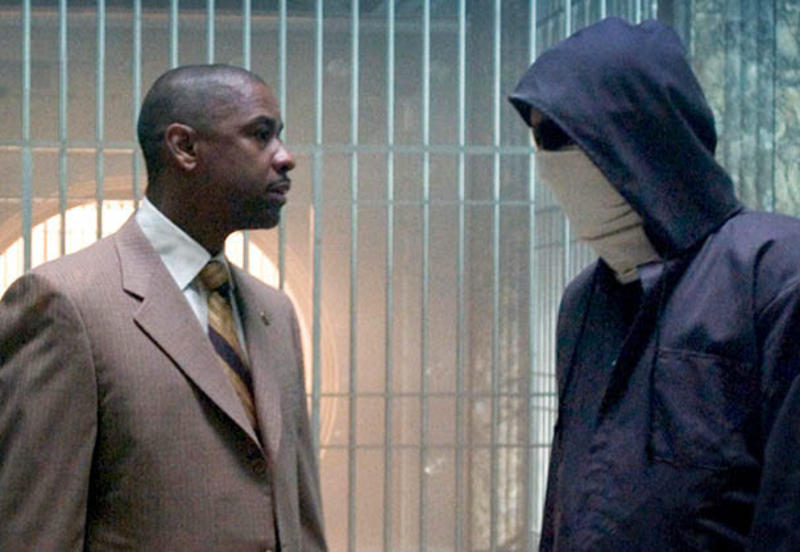
| From the original review: “Hearkening to the halcyon days of Dog Day Afternoon and Serpico, Spike Lee’s Inside Man is a clever contraption indeed — a sleek, intelligent, well-acted NYC heist flick whose central scheme is more about subterfuge, cunning, and misdirection than technical gimmickry. (In too many films in the genre — The Score, or Ocean’s 11, for example — the robbers seem to be spending more on state-of-the-art equipment than they’d actually make in the grift.)…True, some of the plot mechanics in Inside Man could be considered contrived, but, Jodie Foster’s corporate ninja notwithstanding, at least here the people seem real.“
From the year-end list: “[A] fun, expertly-made crime procedural, as good in its own way as the much more heavily-touted Departed. It was also, without wearing it on its sleeve, the film Crash should have been — a savvy look at contemporary race relations that showed there are many more varied and interesting interactions between people of different ethnicities than simply ‘crashing’ into each other. (But perhaps that’s how y’all roll over in car-culture LA.)…Inside Man is a rousing New York-centric cops-and-robbers pic in the manner of Dog Day Afternoon or The Taking of the Pelham One Two Three, and it’s definitely one of the more enjoyable movie experiences of the year.“ |
I love it when a plan comes together. In a decade that sometimes seemed full of them, Spike Lee’s crisp, no-nonsense Inside Man was one of the most purely entertaining heist movies of the oughts. And with primo talent like Willem DeFoe and Chiwetel Ejiofor working as support, you know you have an A-list cast on your hands.
To be honest, his von Trapp roots notwithstanding, Christopher Plummer seemed a bit young to be plausible as a ex-Nazi in the 21st century. (Max Von Sydow might’ve worked, I guess, but he also was born in 1929.) But take that — and Foster’s Fixer — with a grain of salt, and Inside Man made for a great afternoon at the movies. It was a seventies cop yarn set in 21st-century Gotham, expertly assembled by one of NYC’s great directors.
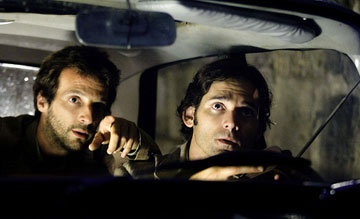
| From the original review: “Munich is a movie well worth-seeing, the rare thriller that’s not afraid to grapple with today’s thorniest political questions, and without insulting the audience’s intelligence by giving easy, simple-minded answers to seemingly insoluble problems. The film may at best be a long triple, but, to his credit, at least Spielberg is swinging for the fences.“ |
True, Steven Spielberg’s Munich includes some major missteps. I still wince when I remember Eric Bana and a pregnant Ayelet Zurer trysting while the Munich kidnappings go south. (The only equally terrible sex scene I can think of offhand would be Patrick Wilson, Malin Ackerman, and Leonard Cohen’s “Hallelujah” in Watchmen.) Nonetheless, Munich was a decently compelling thriller with its heart in the right place and an important message to convey in these dark times: An eye for an eye makes the whole world blind.
The memorable last shot of the film, with the World Trade Center in the background, suggested that Munich was also intended as a pointed response to our foreign policy, post-9/11. But, of course, given how we ended up in Iraq soon after 9/11, a closer movie parallel would have shown Israel responding to the 1972 Olympics massacre by killing a bunch of random Belgians.
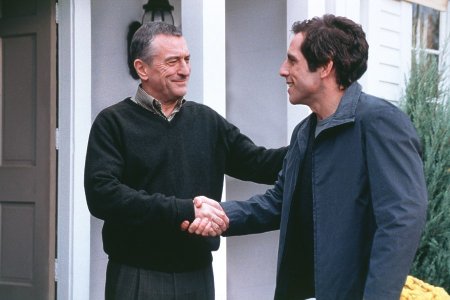
| From the year-end list: “[S]urprisingly good. I expected schlock, and got a genuinely funny fall film.“ |
I didn’t see the sequel (Meet the Fockers), and definitely don’t plan to see the threequel (Little Fockers), which is on the dock for next year. But I remember Meet the Parents being a pretty quality time at the movies, all in all. (FWIW, other than Robert DeNiro generally hamming it up by trading in on his Taxi Driver cachet, the scene that first comes to mind these days is the water polo scene involving Owen Wilson and a slow-motion spike.) Maybe Noah Baumbach can give him a lift in next year’s Greenberg, but, as it is, this was also as funny as Ben Stiller got all decade.
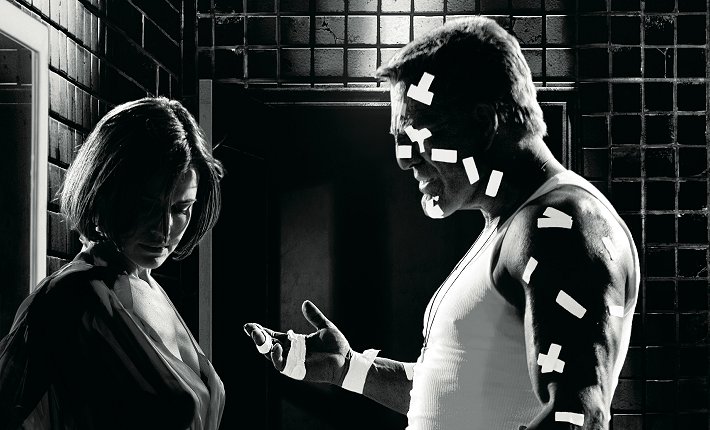
| From the original review: “Forgive me, Father, for I have sinned…and, whatsmore, I liked it. Without a shred of redeeming social value, Frank Miller and Robert Rodriguez’s Sin City is a film very noir. It’s a sick, depraved, and smutty ride into a crime-ridden hellhole of a metropolis, exactly as it should be…Sin City turned out to be a visual marvel and easily Rodriguez’ best film since El Mariachi.“
From the year-end list: “One of the most faithful comic-to-film adaptations on celluloid also made for one of the more engaging and visually arresting cinematic trips this year. I don’t know if the look and feel of Sin City can sustain a bona fide franchise, but this first outing was a surprisingly worthwhile film experience (with particular kudos for Mickey Rourke’s Marv.)“ |
The movie that anticipated Mickey Rourke’s later Wrestler resurgence, Sin City was a crazy-sexy-cool stylistic experiment that remains the best thing Robert Rodriguez has ever been involved with. I missed The Spirit, which obviously went for a very similar look, and from everything I hear that was probably for the best. But in a perfect world, this is what Warren Beatty’s Dick Tracy would have looked like back in 1990.
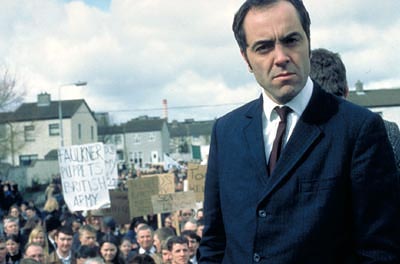
Bloody Sunday was the first of many great movies made by Paul Greengrass in the Oughts, and it ably showed off the hyperreal, you-are-there documentary style he’d use to such great effect throughout the decade. True, it’s as yet unclear whether Greengrass has any other trick in his stylebook: Both of his forthcoming movies — Green Zone (Bourne IV, basically) and They Marched in Sunlight (on Vietnam-era protests) — sound very close to his previous projects, in terms of lending themselves to this hi-def documentarian conceit. Still, it’s a neat trick alright, and one I never grew tired of from Bloody Sunday on.
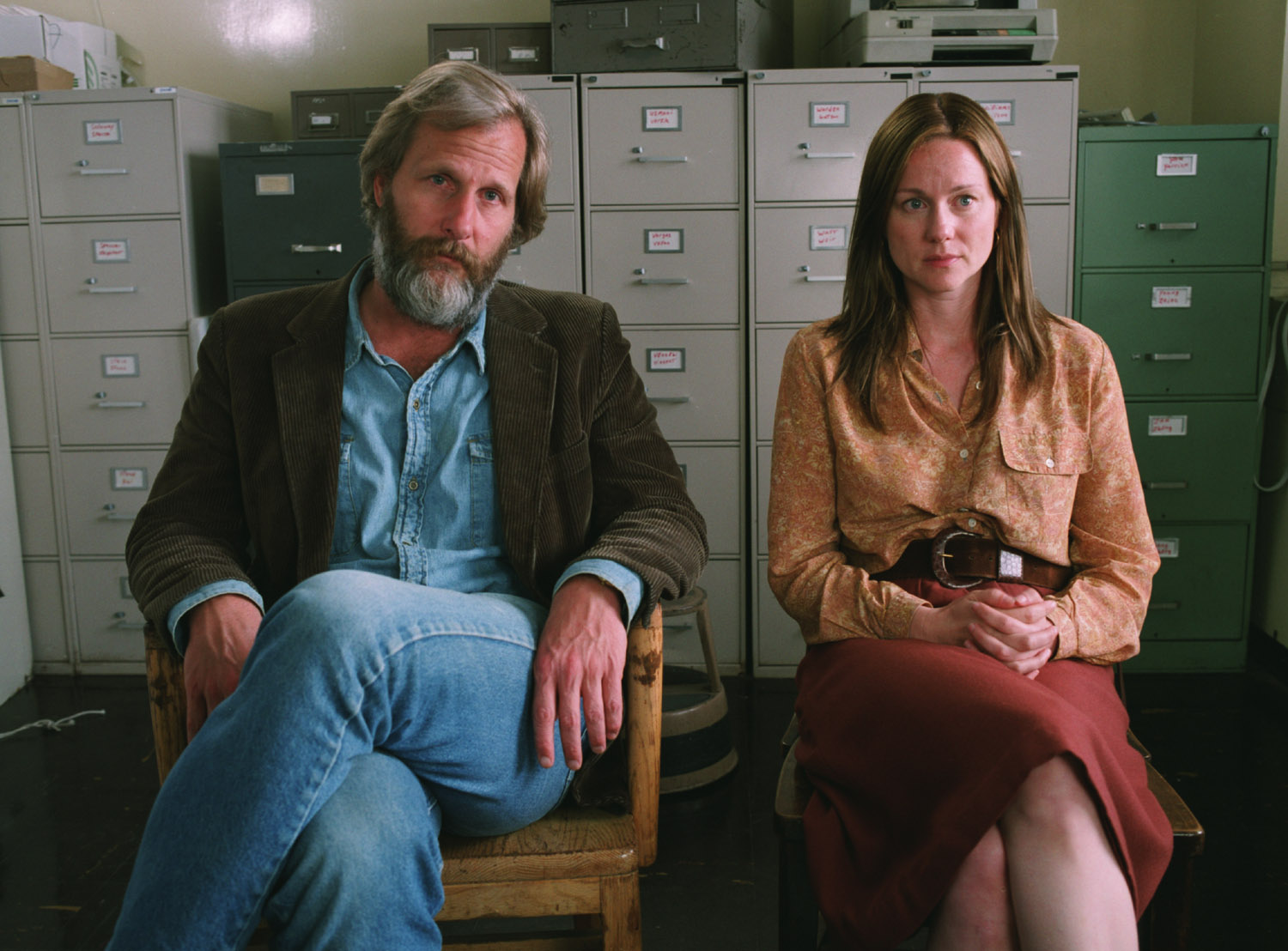
| From the original review: “The movie is mostly episodic vignettes in the life of a broken family and at times suggests a more misanthropic Me, You, and Everyone We Know. But it also feels scarily authentic and is probably one of the most convincing — and wryly funny — depictions of divorce I’ve ever seen on film, with particular kudos going to Jeff Daniels as the sad sack father in this outfit.“
From the year-end list: “The Squid and the Whale made ugly, embittered divorce about as funny as ever it’s likely to get, thanks to Jeff Daniels’ turn as the pretentious, haunted Bernard Berkman.“ |
He went off the rails a bit with 2007’s Margot at the Wedding, but Noah Baumbach (also the co-writer of The Fantastic Mr. Fox and a few other Wes Anderson projects) struck inky black gold with The Squid and the Whale, loosely based on his semi-famous parents’ smash-up. Squid is a bit broad at times — I’m thinking of Billy Baldwin’s tennis instructor in particular — but Jeff Daniels’ Oscar-overlooked performance as the poster child for pretentious (and miserable) academics makes up for a lot of mistakes.

| From the original review: “We never really understand what’s going on, and I could see some folks getting frustrated with this film — usually, incomprehensibility is not a strong suit in movies. Still, for some reason, Primer works as a heady sci-fi tone poem about the cryptic (and dire) consequences of mucking about with the timestream. Mostly unfathomable, sure, but if you’re a fan of the genre, it’s definitely worth catching sometime…perhaps yesterday.“
From the year-end list: “A completely inscrutable sci-fi tone poem on the perils of time travel. Kevin and I saw it twice and still have very little clue as to what’s going most of the time — but I (we?) mean that in the best way possible“ |
2009’s Paranormal Activity made the bigger box-office splash this decade, but Shane Carruth’s Primer was the original no-budget movie that could. A weird and trippy little number alright, Primer once again proved that smart ideas usually trump expensive FX when it comes to memorable sci-fi, even when those ideas are devilishly complicated. Who knows? If I ever write one, it might make my best of the Nineties list too.

Before Christian Bale was the Dark Knight, he made his (adult) name as another deeply nutty rich fella. Mary Harron’s jet-black satire of ’80s yuppie-dom, American Psycho, is one of those rare adaptations that improves on the source material (in this case, a rather lousy book by Bret Easton Ellis) in pretty much every way. It’s ultimately a slasher flick, sure, but from disquisitions on the Huey Lewis back-catalog to the high-stakes status war of business card fonts, there’s a lot of humor to be had amid the slaughter. And to his credit Bale, displaying the intensity he’d henceforth be known for both on-screen and off-, just goes for it, naked chainsawing and all.
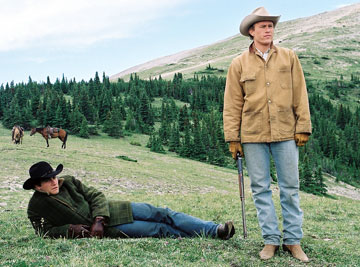
| From the original review: “Heath Ledger’s performance is engrossing, in part because you spend much of the film just trying to figure out what he’s thinking. At times, his character is taciturn to the point of being inarticulate. This speaks in favor of the film’s realism, I suppose — Ennis’s whole life after Brokeback is about caution, misdirection, and concealment….At the same time, though, Ledger seems like he’s underplaying an underwritten character…And that’s ultimately the modest problem with Brokeback Mountain, which is otherwise an excellent film — at times, it feels as somber, restrained, and delicate as Kabuki theater. Particularly in a film that warns of the dangers of bottling up passion, it’d be nice to have seen less Big Sky Country pageantry and more emotion from all the characters on-screen. If that wouldn’t have played in Peoria, so be it.“
From the year-end list: “A beautifully shot and beautifully told love story, although admittedly Ang Lee’s staid Brokeback at times feels like transparent Oscar bait.“ |
If “the Batman” broke out of the Newsies ghetto with American Psycho, the portrayer of his eventual arch-nemesis moved into the A-list with this Ang Lee romance. With its breathtaking Wyoming vistas, Brokeback looks amazing, and it has moments of real grace (like the haunting closing moment.) But, as J. Hoberman so well put it, this was also the “straightest love story since Titanic” Even more than Jonathan Demme’s Philadelphia, Brokeback seems like it won’t age very well. And, even if bottled-up passion is Ang Lee’s usual m.o., the movie’s demureness seems less an artistic choice than a product of its time, particularly when put up against Gus Van Sant’s more vibrant Milk, made only a few years later.
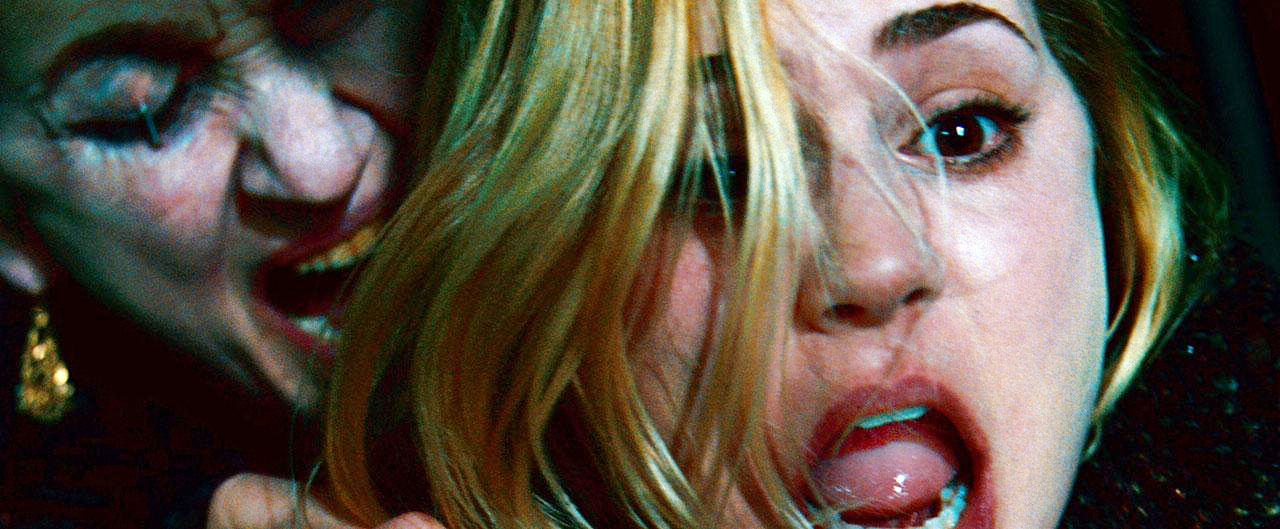
| From the original review: “A loving throwback to the director’s Evil Dead days, and an audience film if there ever was one, [it] delivers a solidly entertaining two hours of low-budge comic mayhem, if you’re in the mood for it. It doesn’t really aspire to be anything more than what it is — a B-movie carnival funhouse. But taken as such, Drag Me to Hell offers thrills, chills, and (gross-out) spills with plenty of Raimi’s old-school tongue-in-cheek.“
From the year-end list: “Besides being easily the most explicitly anti-gypsy film since Borat, Drag Me to Hell was also, in its own way, as much of a Great Recession cautionary tale as Up in the Air. One hopes that when the Senate takes up financial services reform next year, our erstwhile reformers in that esteemed body will note what happened to Alison Lohman when she, against all better judgment, decided to do the bidding of the Banks“ |
Drag Me to Hell isn’t up to the caliber of Sam Raimi’s magnum opus, Evil Dead 2. But it’s in the same goofy-scary key, even without Bruce Campbell around this time. Basically Drag Me to Hell works because it’s unabashedly no more or less than what it aspires to be — a fun, turn-your-brain-off, midnight B-movie. And taken as such, it’s pretty darned entertaining.

| From the original review: “An intelligent, well-made throwback to the conspiracy-minded thrillers of the 1970s (such as The Parallax View and Three Days of the Condor), first-time director Tony Gilroy’s Michael Clayton is a withering and mostly plausible excursion into the ethical dead zone that can emerge at the top levels of the money game…It’s an adult, believable thriller that’s well worth checking out, and George Clooney, as per the norm, is excellent.“
From the year-end list: “Clooney’s impeccable taste in projects continues with this, Tony Gilroy’s meditation on corporate malfeasance and lawyerly ethics (or lack thereof.)…A small film, in its way, but a worthwhile one.“ |
Here’s a movie that one could argue should be higher on the list. A study in grays, Tony Gilroy’s Michael Clayton is an adult movie about conspiracy and compromise that has a lot going in its favor, including a solid anchoring performance by George Clooney and great work in the margins by Tom Wilkinson, Danny O’Keefe, and the late Sydney Pollack. I take off points for the convenient business with the horses and some of the artsy kerfuffling surrounding Tilda Swinton’s character, but Michael Clayton is nonetheless a very good film.
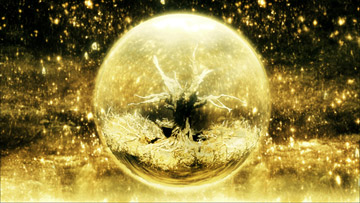
| From the original review: “I found it a bit broad at times, particularly in the early going, and I definitely had to make a conscious decision to run with it. That being said, I thought The Fountain ultimately pays considerable dividends as a stylish, imaginative, and melancholy celebration of the inexorable cycle of life, from birth to death ad infinitum…I’m not sure you’ll like it — it’s very possible you’ll love it — but I’m willing to bet, either way, that it’ll stick with you.“
From the year-end list: “Darren Aronofsky’s elegiac ode to mortality and devotion was perhaps the most unfairly maligned movie of the year…Clearly a heartfelt and deeply personal labor of love, The Fountain — admittedly clunky in his first half hour — was a visually memorable tone poem that reminds us that all things — perhaps especially the most beautiful — are finite, so treasure them while you can.“ |
Here’s another one I haven’t seen since that first screening in 2006, and I have a suspicion my positive reaction may not hold up so much on a second viewing. (Sitting next to Famke Janssen generally makes a movie seem better, no doubt.) Still, I admire The Fountain for what it tried to do, even if it doesn’t all quite work at times. There’s something to be said for a movie that so nakedly wears its heart on its sleeve.
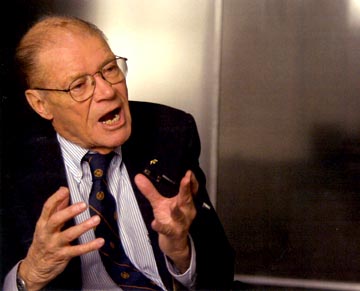
| From the original review: “As a documentary, The Fog of War sometimes gets clouded by its own cinematic devices…[but] the film works best when it’s simply an engaging monologue by an intelligent, evasive, and often frustrating Cold Warrior as he muses over a life perhaps not-so-well lived. “
From the year-end list: “[A] spry McNamara succeeds in penetrating the fog of time to examine how he himself became lost in the maze-like logic of war. If you can withstand the frequent Phillip Glass-scored barrages, it’s worth a see.“ |
Robert McNamara may have left us this past July, but his ghost haunts us still. The Oughts saw America engaged in two long wars that have moved in directions their planners did not intend or anticipate, and that we continue to wage this very moment. And, like almost all wars in human history, they’ve both been easier to start than finish. With another conflagration on his mind, T.S. Eliot once wrote: “Between the Idea and the Reality falls the Shadow.” Well, as McNamara and Errol Morris remind us here, when it comes to conflict, Between the Planning and the Execution lies The Fog of War. It’s something we’d do well to remember in the decade to come.
Since I’m behind on my movie reviews, as ever, I’m hitting up the past few summer flicks I’ve witnessed in bulk. So, in brief:

If you haven’t seen the previews, Christine Brown (Alison Lohman, quite appealing) is an ex-farm-girl trying to shake off her country roots and jump ahead a few social strata in the City of Angels, and she’s doing everything she can to be (or at least seem) upwardly mobile — she’s listening to pronunciation tapes to lose her accent, she’s foregoing sweets to keep her (newly thin) figure, she’s eyeing a promotion to assistant manager at the bank she works at, she has wildly overpaid for a trendy Mac laptop, etc. Then again, the last decision was probably forced on her, as Christine is currently dating Mac Guy (Justin Long), here Clay, a new psychology professor whose wealthy, elitist parents radiate condescension towards poor Christine. (By the way, fellow gradual students: if the kid being dragged to Hell before the opening credits didn’t tip you off that this is fantasy, the sight of Long starting a new academic job, complete with spiffy office, should do the trick. Riiiiight.)
At any rate, in her halfhearted attempts to seem ruthless enough for her bank promotion, Christine one day refuses the pleas of a sickly (re: gross) old woman (Lorna Raver) and signs off on the foreclosure of her home. Huge mistake, as this grotesque crone is actually of the gypsy persuasion — Yes, this movie is gonna make massive bank in Kazakhstan. Soon enough, after a comic brawl that involves stapled eyes and a lot of gummings, said gypsy dooms Christine to Hell. Hades. The Bad Place. And so, poor Ms. Brown only has three days — days which she will spend tormented by the lamia, a shadowy goat demon from the nefarious netherrealms — to save her soul. And, if you factor in LA ‘s infernal traffic, that’s really only two days…
One of the running jokes in Drag Me to Hell is that pretty much everybody around Christine — her boss (David Paymer), her co-worker (Reggie Lee), her gypsy nemesis, Clay’s parents, even Clay, whose warmth and sincere fondness for Christine is infused with noblesse oblige — is probably more deserving of her dire straits than she. Raimi’s film is positively Victorian in its punishing of Christine for trying to transgress class boundaries — apparently, there is no sin worse in LA than social striving. Still, pondering Drag Me to Hell‘s socioeconomic implications for any length of time is missing the point. Best to just sit back and let the blood, maggots, and embalming fluid flow. And if the elderly woman a few seats over won’t stop hacking, coughing, or chattering during the film — trust me, you’ll want to just let her do her thing.
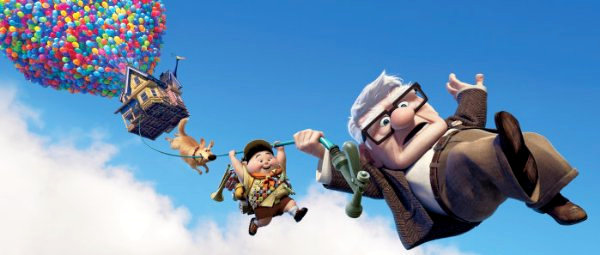
Up begins with a meet-cute between nerdy Carl (eventually, Ed Asner) and adventurous Elie (Elizabeth Docter), two youngsters who share an inordinate fondness for explorer Charles Muntz (Christopher Plummer) and his Spirit of Adventure, the zeppelin he piloted to faraway Paradise Falls, never to return. These two kids enter a pact that they will one day follow in the footsteps of their hero…but, after love, puberty, marriage, and a life well-lived, they never quite make it. By ten minutes in, Elie has passed on, Carl is now an old and curmudgeonly retiree, and their longtime house is about to be torn down by ne’er-do-well corporate developers. Knowing no gypsies, Carl takes drastic action of a different kind — he attaches several hundred helium balloons to the premises and simply floats away. And, with an inadvertent stowaway in tow — That would be Russell (Jordan Nagai), the would-be Wilderness Scout who just wants to “assist the elderly” and procure his final badge — Carl finally has that long-awaited Paradise Falls adventure, which includes but is not limited to an ill-fated reunion with Muntz, a giant bird named Kevin, and a gaggle of roaming, Bowlingual-enhanced dogs…Squirrel!
Much hilarity and occasional melancholy ensues, of course, as per the norm. But for all the film’s many strengths, I thought Up suffered from a grievous structural flaw that knocks it out of the top tier of Pixar offerings. Remember how the first forty minutes of WALL-E just overpowered the broader and more whimsical “starship fatties” half of the movie? Well, Up feels even more frontloaded. The first ten minutes or so of the film, encompassing Carl and Elie’s many decades together, is so concise and elegantly told that it just put me out of the mood for the colorful birds and talking dog hijinx that follows. Ever see the ST:TNG episode where, due to that particular week’s encounter with a cosmic energy force, Picard ends up living out an entire lifetime — marriage, kids, grandkids, and all — while only forty-five minutes passes on the Enterprise? How was he supposed to go back to the usual random shuttling back-and-forth across the Alpha Quadrant after an experience like that? Well, Up felt for me much the same. It basically peaks in the first ten minutes, as it tells the story of a lifetime, and everything thereafter — tho’ kids will probably feel different — is just a slow leaking of air.
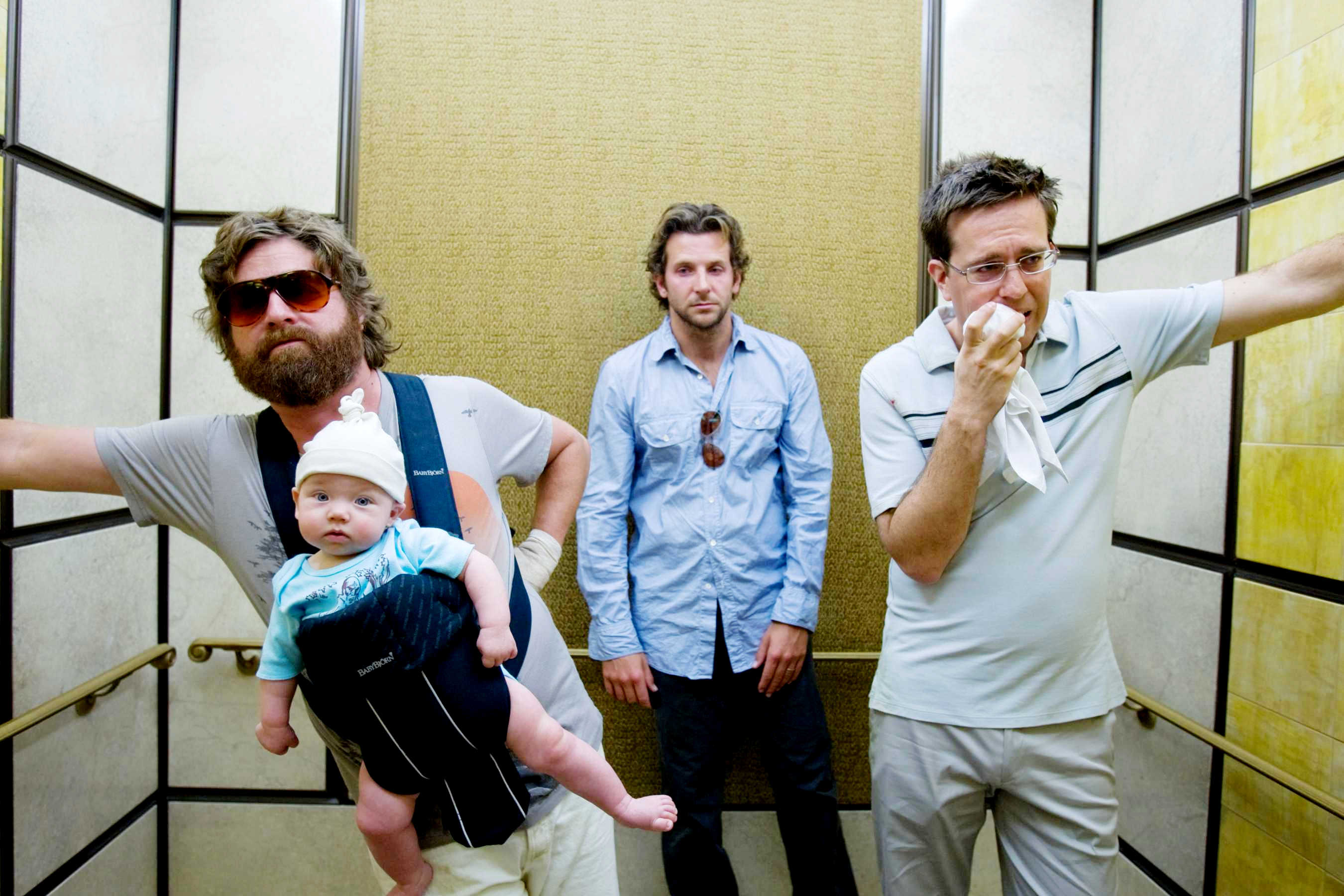
The premise of The Hangover may be the funniest thing about it. Four friends — ok, three friends and Alan, a weird deadbeat soon-to-be brother-in-law (Zack Galifianakis) — descend upon Vegas to paint the town red for a blowout bachelor party. Cut to the next day, and things have clearly gotten out of hand. Doug the groom (Justin Bartha) is nowhere to be found. Phil the lothario schoolteacher (Bradley Cooper) has a monster headache and a hospital band around his wrist. Stu the henpecked, cuckolded dentist (Ed Helms) has lost a tooth and gained a wife. And Alan can’t find his pants or his man-satchel…but has found a tiger in the bathroom and a toddler in the closet. So what the eff happened? The remaining three musketeers try to piece together clues of their Big Night and find their lost friend before zero hour in California, when Bridezilla awakens. Can they save the day in time?
The Hangover works best if you think that absolutely anything could’ve happened the night before. As it turns out, tho, most of what happened is constrained by what you’ve seen in the previews (or, barring that, the promotional materials all over the theater I was in — Heather Graham, check. Mike Tyson, check. Mike Epps, check.) And so what you’re mostly left with is a few hours of waiting for these haggard guys to tick off the next few boxes and get up to speed with the trailer. In the meantime, their company is, well, mildly entertaining, I guess, although (as in Old School) these dudes — and the sense of humor — are all a bit too mook for my taste. (If you find bare asses funny on their own terms, tho’, have at it.) A lot of the jokes revolves around Zack Galifianakis’s Alan, who’s…not quite right in the head. But, frankly, he just seems like a collection of comedy writing tics than a full-fledged character like, say, Walter Sobchak in Lebowski. What can I say? Humor is a delicate thing, and it differs for different people. But, aside from a line here or there (like the “Holocaust ring” one in the trailer), I just didn’t find The Hangover all that funny. Your mileage may vary.
Besides, on my first wild weekend in Vegas, Dubya started an unnecessary, multibillion-dollar war. Beat that for crazy.
 Charles, Cash, Curtis, Dylan, Strummer…Given the glut of rock biopics and documentaries we’ve seen in recent years, it’s well past time that influential musical chameleon Dewey Cox got his due. Unfortunately, just as James Mangold’s Walk the Line felt too staid and conventional to capture the true appeal of the Man in Black, Jake Kasdan’s Walk Hard: The Dewey Cox Story — which I saw in the days before Christmas — never really gets inside the head of the Giant Midget. Sure, it covers most of the important facts about his life — the childhood tragedy, the struggle with smell-blindness, the breakout single, the dark f**king middle period, the LSD decade, the selling out. But, while John C. Reilly does what he can as Cox (and the resemblance is admittedly uncanny), I never felt while watching Walk Hard that Kasdan actually “got” the man or his music…or his monkey or giraffe, for that matter. Given his famous father and his earlier affiliation with Freaks & Geeks, Kasdan seemed like he would be the guy to do Cox justice, but this is sadly a missed opportunity. It’s just too bad Todd Haynes was busy with I’m Not There…Once again, nearly fifty years after the fact, Zimmerman will be walking-hard away with all Dewey’s laurels.
Charles, Cash, Curtis, Dylan, Strummer…Given the glut of rock biopics and documentaries we’ve seen in recent years, it’s well past time that influential musical chameleon Dewey Cox got his due. Unfortunately, just as James Mangold’s Walk the Line felt too staid and conventional to capture the true appeal of the Man in Black, Jake Kasdan’s Walk Hard: The Dewey Cox Story — which I saw in the days before Christmas — never really gets inside the head of the Giant Midget. Sure, it covers most of the important facts about his life — the childhood tragedy, the struggle with smell-blindness, the breakout single, the dark f**king middle period, the LSD decade, the selling out. But, while John C. Reilly does what he can as Cox (and the resemblance is admittedly uncanny), I never felt while watching Walk Hard that Kasdan actually “got” the man or his music…or his monkey or giraffe, for that matter. Given his famous father and his earlier affiliation with Freaks & Geeks, Kasdan seemed like he would be the guy to do Cox justice, but this is sadly a missed opportunity. It’s just too bad Todd Haynes was busy with I’m Not There…Once again, nearly fifty years after the fact, Zimmerman will be walking-hard away with all Dewey’s laurels.
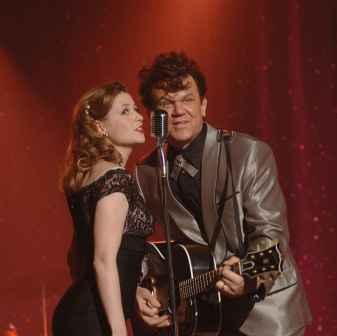 Kasdan’s take on Dewey’s story begins just before Cox’s final performance at the Lifetime Achievement Awards — You may remember Eddie Vedder’s memorable tribute speech, and the Jewel/Lyle Lovett/Jackson Browne/Ghostface Killa mash-up of “Walk Hard” got a lot of radio run over that summer — before flashing back to that defining moment in the White Indian’s life as a boy, the famous accidental cleaving-in-two of his prodigy brother. (“I’m cut in half pretty bad, Dewey.“) Rallying to his brother’s fallen musical standard, the teenage Dewey soon finds himself thrown out of the house, married young (to Edith, as played by SNL’s Kristen Wiig), and working as a busboy at a local black club, where he one day wows the crowd with a version of his early hit, “(Mama) You Got to Love Your Negro Man.” Soon thereafter, he lands a band and a record contract, and after the cutting of “Walk Hard,” the rest is history: Cox buys a monkey, lapses into a vicious drug habit, falls for his voluptuous backup singer Darlene Madison (Jenna Fischer), gets clean, lapses into another vicious drug habit…well, you know the rest.
Kasdan’s take on Dewey’s story begins just before Cox’s final performance at the Lifetime Achievement Awards — You may remember Eddie Vedder’s memorable tribute speech, and the Jewel/Lyle Lovett/Jackson Browne/Ghostface Killa mash-up of “Walk Hard” got a lot of radio run over that summer — before flashing back to that defining moment in the White Indian’s life as a boy, the famous accidental cleaving-in-two of his prodigy brother. (“I’m cut in half pretty bad, Dewey.“) Rallying to his brother’s fallen musical standard, the teenage Dewey soon finds himself thrown out of the house, married young (to Edith, as played by SNL’s Kristen Wiig), and working as a busboy at a local black club, where he one day wows the crowd with a version of his early hit, “(Mama) You Got to Love Your Negro Man.” Soon thereafter, he lands a band and a record contract, and after the cutting of “Walk Hard,” the rest is history: Cox buys a monkey, lapses into a vicious drug habit, falls for his voluptuous backup singer Darlene Madison (Jenna Fischer), gets clean, lapses into another vicious drug habit…well, you know the rest.
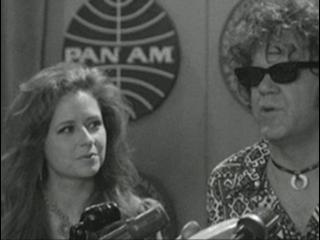 Ok, ok, let’s go ahead and break the fourth wall. As a played-straight parody of the rock biopic genre, Walk Hard is admittedly uneven most of the time. But, it makes for a relatively amusing two hours if you’re in the mood for it. It’s nowhere near as funny as the original Airplane or Top Secret, but I’d say it holds its own with the Hot Shots flicks, and it’s miles above Scary Movie and its ilk. Yes, the film can be unfocused and scattershot (There’s even a decently funny recurring gag involving the kitchen sink.) A lot of the jokes seem like leftovers from the last Will Ferrell script, and, like Trey Parker and Matt Stone’s Team America, Walk Hard occasionally follows the beats of its object of parody so closely that the movie loses its edge. Still, there are definitely some quality moments therein, from Tim Meadows trying not to seduce a naive Dewey into a marijuana habit to Cox meeting Buddy Holly (Frankie Muniz, inspired casting) and the Fab Four (Surprisingly, Justin “Mac Guy” Long is far and away the funniest as George, while Jack Black’s Paul is woefully bad and Paul Rudd’s John is just…strange.)
Ok, ok, let’s go ahead and break the fourth wall. As a played-straight parody of the rock biopic genre, Walk Hard is admittedly uneven most of the time. But, it makes for a relatively amusing two hours if you’re in the mood for it. It’s nowhere near as funny as the original Airplane or Top Secret, but I’d say it holds its own with the Hot Shots flicks, and it’s miles above Scary Movie and its ilk. Yes, the film can be unfocused and scattershot (There’s even a decently funny recurring gag involving the kitchen sink.) A lot of the jokes seem like leftovers from the last Will Ferrell script, and, like Trey Parker and Matt Stone’s Team America, Walk Hard occasionally follows the beats of its object of parody so closely that the movie loses its edge. Still, there are definitely some quality moments therein, from Tim Meadows trying not to seduce a naive Dewey into a marijuana habit to Cox meeting Buddy Holly (Frankie Muniz, inspired casting) and the Fab Four (Surprisingly, Justin “Mac Guy” Long is far and away the funniest as George, while Jack Black’s Paul is woefully bad and Paul Rudd’s John is just…strange.)
 At any rate, I’m not going to give all the jokes away here, suffice to say that Cox’s black-and-white Dylan period tickled my funny bone the most. Dewey does two Dylanesque ditties here: The first, “Royal Jelly”, is a gloriously inscrutable poetic epic a la “Desolation Row” (“Mailboxes drip like lampposts from the twisted birth canal of the coliseum, rimjob fairy teapots mask the temper tantrum, O say can you see ’em?“) [See it live.] The other, “Let Me Hold You (Little Man)“, is an un-PC The Times They Are A Changin’ screed directed at the injustice faced by all the, uh, little people. (“Let me hold you, midget man, pretend that you’re flying in space. Let me hold you, little man, so the dog will stop licking your face.“) High art it’s not, and I can’t recommend rushing out and seeing it or anything. But, for a few solid chuckles over the course of two hours, Dewey Cox and Walk Hard deliver the goods decently enough. Someday — perhaps soon, given that Forgetting Sarah Marshall, Pineapple Express, and Drillbit Taylor are all due next year — the helium will probably leak out of the Judd Apatow comedy factory’s balloon. But Cox, thankfully enough, isn’t the canary in the coalmine just yet.
At any rate, I’m not going to give all the jokes away here, suffice to say that Cox’s black-and-white Dylan period tickled my funny bone the most. Dewey does two Dylanesque ditties here: The first, “Royal Jelly”, is a gloriously inscrutable poetic epic a la “Desolation Row” (“Mailboxes drip like lampposts from the twisted birth canal of the coliseum, rimjob fairy teapots mask the temper tantrum, O say can you see ’em?“) [See it live.] The other, “Let Me Hold You (Little Man)“, is an un-PC The Times They Are A Changin’ screed directed at the injustice faced by all the, uh, little people. (“Let me hold you, midget man, pretend that you’re flying in space. Let me hold you, little man, so the dog will stop licking your face.“) High art it’s not, and I can’t recommend rushing out and seeing it or anything. But, for a few solid chuckles over the course of two hours, Dewey Cox and Walk Hard deliver the goods decently enough. Someday — perhaps soon, given that Forgetting Sarah Marshall, Pineapple Express, and Drillbit Taylor are all due next year — the helium will probably leak out of the Judd Apatow comedy factory’s balloon. But Cox, thankfully enough, isn’t the canary in the coalmine just yet.
In the trailer bin, which should be teeming over soon with Thanksgiving upon us: Did Bosworth break up the band? Across the Universe‘s Jim Sturgess forgoes the Beatles for a blackjack team in the trailer for Robert Luketic’s 21 (a.k.a. Ben Mezrich’s Bringing Down the House), also starring Kevin Spacey, Kate Bosworth, and Laurence Fishburne. Nature documentarian Steve Zahn goes on the trail of Bigfoot in the so-so trailer for Fred Wolf’s Strange Wilderness, also with Allen Covert, Mac Guy, Jonah Hill, Ernest Borgnine, Jeff Garlin, and Joe Don Baker. And Frodo (Elijah Wood) and (animated) Aragorn (John Hurt) team up to solve a string of horrific math-tinged crimes in the Spanish-language trailer for Alex de la Iglesia’s The Oxford Murders, from the book by Guillermo Martinez. Doubt I’ll see any of these, but you never know. Update And another: Don’t say Lovecraft didn’t try to warn us…something Huge, Malevolent, and (hopefully) Cthulhuian stalks the streets of New York in the new trailer for JJ Abrams’ monster movie Cloverfield.
Speaking of I’m Not There, the Todd Hayne’s new Dylan biopic has a teaser out, where you can catch brief glimpses of all the varied permutations of Bob. (Blanchett, Bale, Ledger, Gere, Whishaw, et al.) And, also in the trailer bin, Woody Allen ventures back into Match Point territory with Ewan MacGregor, Colin Farrell, Tom Wilkinson, and newcomer Hayley Atwell in the new (French-subtitled) preview for Cassandra’s Dream. And John C. Reilly brings to life one of Dylan’s formative influences in the parody-heavy trailer for Walk Hard: The Dewey Cox Story, brought to you by the Freaks & Geeks team of Jake Kasdan and Judd Apatow and also starring Jenna Fischer, Kristen Wiig, and Tim Meadows (as well as Jack White as Elvis and Paul Rudd, Jack Black, Mac Guy, and Jason Schwartzman as John, Paul, George, and Ringo.)
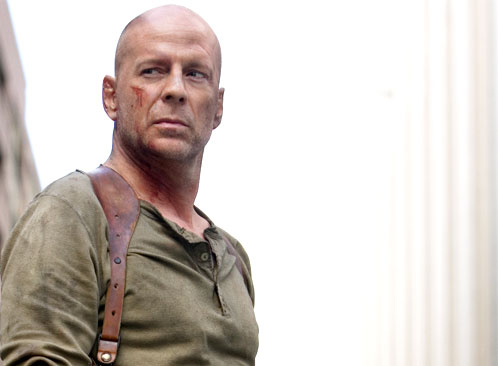 I find Len Wiseman’s Live Free or Die Hard, a.k.a. Die Hard 4 or “Die Hard in the Chesapeake,” a difficult movie to review (which is perhaps why it’s taken me an extra week to spend any time on it.) As a long-awaited fourth installment in the Increasingly Unlikely Trials of John McClane, I’d say it’s probably better than Die Harder (about which I only really remember Fred Thompson as an ATC exec) and Die Hard 3 (which brings to mind Samuel L. Jackson in Malcolm X glasses doing jug-of-water problems), and it’s a considerably more enjoyable movie than I expected from the director of Underworld. But it also doesn’t make much sense, it traffics in action-movie cliche, most of its boldest setpieces were telegraphed in the previews, and it doesn’t hold a candle to the still-quite-impressive first film, which ranks deservedly high in the Actioner Hall of Fame. In short…well, it is what it is. I was intermittently amused and diverted by about half of Live Free or Die Hard, restless and somewhat bored by the other half. Bruce Willis has always been an easy actor to root for, and it’s definitely fun to see him back in the saddle as America’s favorite Working-Class Hero, but in the end I thought this Die Hard didn’t really pay the nostalgic dividends of, say, Sly Stallone’s recent return as Rocky Balboa. Willis doesn’t embarrass his franchise by any means, but he doesn’t really add much of note here either.
I find Len Wiseman’s Live Free or Die Hard, a.k.a. Die Hard 4 or “Die Hard in the Chesapeake,” a difficult movie to review (which is perhaps why it’s taken me an extra week to spend any time on it.) As a long-awaited fourth installment in the Increasingly Unlikely Trials of John McClane, I’d say it’s probably better than Die Harder (about which I only really remember Fred Thompson as an ATC exec) and Die Hard 3 (which brings to mind Samuel L. Jackson in Malcolm X glasses doing jug-of-water problems), and it’s a considerably more enjoyable movie than I expected from the director of Underworld. But it also doesn’t make much sense, it traffics in action-movie cliche, most of its boldest setpieces were telegraphed in the previews, and it doesn’t hold a candle to the still-quite-impressive first film, which ranks deservedly high in the Actioner Hall of Fame. In short…well, it is what it is. I was intermittently amused and diverted by about half of Live Free or Die Hard, restless and somewhat bored by the other half. Bruce Willis has always been an easy actor to root for, and it’s definitely fun to see him back in the saddle as America’s favorite Working-Class Hero, but in the end I thought this Die Hard didn’t really pay the nostalgic dividends of, say, Sly Stallone’s recent return as Rocky Balboa. Willis doesn’t embarrass his franchise by any means, but he doesn’t really add much of note here either.
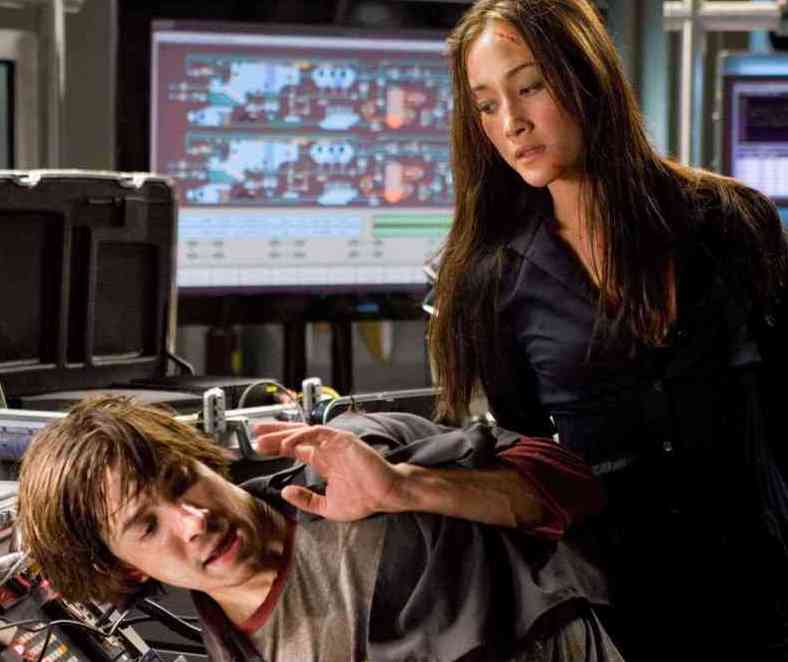 So what’s the doomsday scenario this time? Well, as the movie begins, we watch various teenage computer hackers, geeks, and webheads out of Fanboy Central Casting report in to the comely villainess Mai (Maggie Q) with their various h4xor pet projects, then — thanks to their sabotaged PCs — get rubbed out in an explosive fireball of Playstation parts, computer cables, Red Bull cans, and collectible figurines. Escaping this awful fate — but only barely — is Mac Guy (Justin Long), who was fortunate enough to have had NYPD Det. John McClane in the nearby Rutgers area, troubling potential suitors to his daughter (Mary Elizabeth Winstead), and asked by the usual consortium of concerned government NSA-types to pick the kid up. Soon, McClane and Mac Guy are on a road trip to DC to see these aggrieved Feds when the real cybermachinations begin: all traffic lights go green, all fire alarms go off, all stocks plunge. And, we come to discover, pulling the strings is an even more aggrieved Fed, one Thomas Gabriel (Tim Olyphant), a cyberterrorism expert whose Richard Clarke act got him fired and buried by the blase powers-that-be. Now a private citizen, he’s out to make them, and all America pay, unless McClane can work his analog mojo to stop Gabriel’s digital devastation…
So what’s the doomsday scenario this time? Well, as the movie begins, we watch various teenage computer hackers, geeks, and webheads out of Fanboy Central Casting report in to the comely villainess Mai (Maggie Q) with their various h4xor pet projects, then — thanks to their sabotaged PCs — get rubbed out in an explosive fireball of Playstation parts, computer cables, Red Bull cans, and collectible figurines. Escaping this awful fate — but only barely — is Mac Guy (Justin Long), who was fortunate enough to have had NYPD Det. John McClane in the nearby Rutgers area, troubling potential suitors to his daughter (Mary Elizabeth Winstead), and asked by the usual consortium of concerned government NSA-types to pick the kid up. Soon, McClane and Mac Guy are on a road trip to DC to see these aggrieved Feds when the real cybermachinations begin: all traffic lights go green, all fire alarms go off, all stocks plunge. And, we come to discover, pulling the strings is an even more aggrieved Fed, one Thomas Gabriel (Tim Olyphant), a cyberterrorism expert whose Richard Clarke act got him fired and buried by the blase powers-that-be. Now a private citizen, he’s out to make them, and all America pay, unless McClane can work his analog mojo to stop Gabriel’s digital devastation…
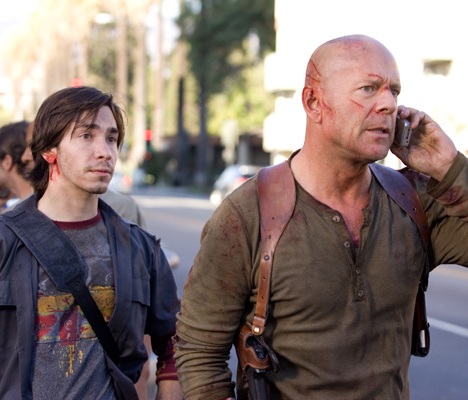 Uh, Mac Guy? McClane’s all-grown-up teenage daughter? And yet, one of the bigger surprises in this otherwise regular-as-clockwork movie is how well it sidesteps what at first look to be really obvious pitfalls. For example, sidekick Justin Long doesn’t come off half as irritating as you might expect, and in fact acquits himself rather well. And while Winstead is given some predictably schlocky “Baby Badass” moments — a la Katherine Heigl in Under Siege 2 — they’re thankfully few and far between. (As for the baddies, Olyphant’s Seth Bullock seethe is put to good use here, but he’s still no Hans Gruber…although I think I’ll take Maggie Q and a parkour henchman or two (a la Casino Royale) over Alexander Godunov.) And, for his part, Bruce Willis is still convincingly tough, crazy, and disgruntled as the man of the hour despite himself….one hopes Harrison Ford holds up as well for his upcoming stint in Indy IV.
Uh, Mac Guy? McClane’s all-grown-up teenage daughter? And yet, one of the bigger surprises in this otherwise regular-as-clockwork movie is how well it sidesteps what at first look to be really obvious pitfalls. For example, sidekick Justin Long doesn’t come off half as irritating as you might expect, and in fact acquits himself rather well. And while Winstead is given some predictably schlocky “Baby Badass” moments — a la Katherine Heigl in Under Siege 2 — they’re thankfully few and far between. (As for the baddies, Olyphant’s Seth Bullock seethe is put to good use here, but he’s still no Hans Gruber…although I think I’ll take Maggie Q and a parkour henchman or two (a la Casino Royale) over Alexander Godunov.) And, for his part, Bruce Willis is still convincingly tough, crazy, and disgruntled as the man of the hour despite himself….one hopes Harrison Ford holds up as well for his upcoming stint in Indy IV.
Nevertheless, what Live Free or Die Hard is really missing is the narrative economy of the first film, which all took place within the increasingly claustrophobic confines of the Nakatomi Building (thus spurring the “Die Hard on a *blank*” genre in the first place.) Instead, this movie is sprawled out across the mid-Atlantic, with McClane & co. actually driving off to West Virginia and back at one point. Perhaps as a result, the tension in Live Free or Die Hard often goes completely slack, as McClane and Mac Guy have nothing to do but trade clunky exposition or thinly veiled movie-message pablum while driving from place to place. And unlike in the first movie, when, say, McClane is forced to do unsavory things like pull pieces of broken glass out of his torn, bloodied feet, there’s never much sense of any real danger or menace in this film. Perhaps it’s progress, I suppose, but dying hard here doesn’t seem half as troubling as it used to.